#this is the part where a responsible blogger would say for legal reasons this is a joke. i say let em sue
Explore tagged Tumblr posts
Text








not bisexual but i do respect the culture 💗💜💙
#corey#slibbs#this is the part where a responsible blogger would say for legal reasons this is a joke. i say let em sue#happy bi visibility to you bisexual such n suches in my phone i love what youve done to the place#<- the place being metal#i wanted to get a better unhighlighted screenshot of that bit from seven deadly sins#but it looks way funnier with this piece of text being like we were bad...the rebels...the outcasts of a generation...#and a big jarring orange 'fag' right in the middle. i have the humor of a boy watching ben 10 for the first time#ALSO GUYS. AM I CRAZY. AM I BATSHIT FUCKING INSANE. OR DID THE SIC LYRICS CHANGE#FROM FAGGOT TO FUCK IT. LIKE HAVE I BEEN MISHEARING THIS SONG THIS WHOLE TIME OR ? ORRRRR ?#I COULDVE. SWORN. IT SAID FAGGOT. I FEEL CRAZY#im gonna consult my cd about this
12 notes
·
View notes
Text
Since this genius seems to be blocking...

>Teenager goes into a gunstore and buys a an ATAC with 1000 rounds of 5.56. No questions asked.
You're carefully leaving out the part where the teenager is a legal adult for almost all intents and purposes in every single state.
I'd say you're also leaving out the part where rifle murders are less common than knifes, blunt objects, or bare hands, but I don't think you're that well-informed.
>But someone middle aged walks in and wants a handgun with one round.
There are any number of reasons someone might want a single bullet that are not 'suicide'. For example, if they're a blogger and they want to take a photo of two different rounds to make a comparison post.
Or maybe they have some sort of OCD that wants to keep topped up to a precise number.
Maybe they’re carrying, and realized they’re short a round, but don’t want to buy a whole box.
> Both are infallibly red flags, but one is societally acceptable. Neither should be.
“Everyone should share my prejudices, and they should be enforced by law.”
I would also bet money you have no actual statistics to back either of these up.
>As someone who grew up in a military family around guns, owns guns and understands guns you've created a recreational culture around a tool that is primarily used for taking life.

I love how you have to lump together hunting, animal control, murder, self-defense, and suicide to make that even remotely true. Five different categories, but you only talked about murder and suicide in the lede.
And most of those categories - probably the majority of use, statistically - are perfectly legal, safe, responsibly used options.
>Grow the fuck up, your "liberty" isn't infringed upon by mandatory state psych and background evaluation for gun ownership.
"Making you do things before you can legally do other things is not preventing you from doing those other things."
That's kind of like arguing that age checks before drinks purchases aren't infringing on people's freedom to drink. Or, heck, driver's licenses.
Also, I suspect the vast majority of gun purchases already go through stores, which means mandatory background checks anyway. Most murderers are not legal owners.
>Honestly the reason I own guns is you totally unhinged inbred fucks walk around with military grade firearms and have an IQ equal to a sock filled with burning pubic hair.
You say this while you imply that "military grade" means "more deadly". And think being edgy and angry and insulting is somehow more persuasive to gun owners, assuming this isn't posturing for other anti-gun idiots.
Also, I'm literally from a country with strict gun control, low legal ownership, and a higher gun murder rate than America. It's not remotely the only one.



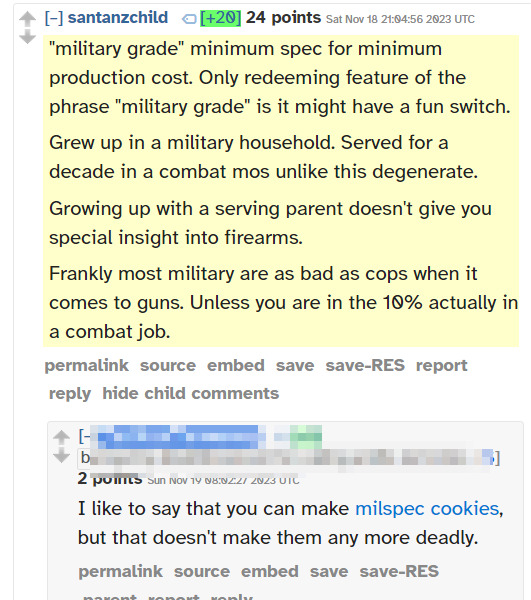
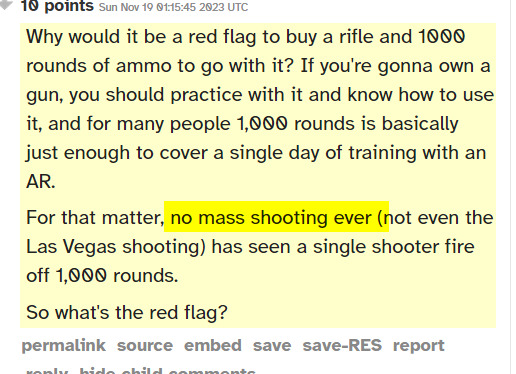
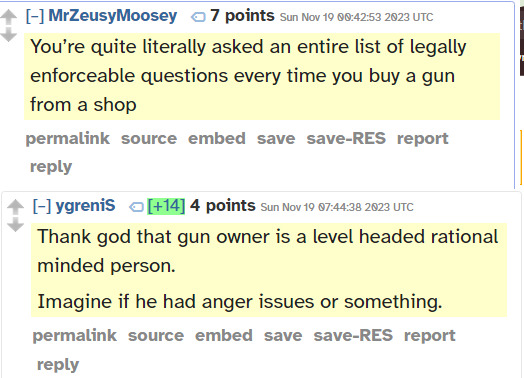
88 notes
·
View notes
Note
Hi! I admire your open minded responses and ethics. You have said in some posts that you believe Taehyung and Jungkook are mutually attracted to each other but that they haven't confessed or consummated. (Please correct me if I got it wrong!) I was wondering why, in your opinion, Taehyung and Jungkook wouldn't just take the leap and be together after being on a journey of so many years? Is it your opinion that homophobic society is holding them back? Is it the risks to the band? They seem like two rich, empowered men to me. Taehyung seems like a very honest and authentic person. And Jungkook tweeted a drawing he made of a famous line from Love Simon. These guys would know that being in a committed same sex relationship is an option, right? I am not saying they could necessarily be open about it but I find the idea of them wanting it but not acting on it challenging.
It is a sentiment that I see in a lot of cis het female dominated spaces that revolve around queer men, or the idea of queer men. It's love, it's attraction, it's everything but the relationship. And the sex. It strikes me as a heteronormative overlay on what queer men can and can't do, as if the relationship is allowed to be sexual and romantic only in y'all's minds. It looks like shipping but it also looks like erasure.
Personally, I do not think that Taekook are together but I could be wrong. Anything is possible. I admire the way you stand up for what is right and role model that it is never ok to be a bully. What people consider 'harmless' is relative. I don't buy any 'ships' in BTS as purely aesthetic relationships. I am a gay person and can't take away my identity while seeing this content. Hovering between the space of 'they are real' and 'I just want them to be real' is a safe space for bloggers to be. But it isn't a great representation of genuine LGBTQ+people. A 25 yr old and a 23 year old aren't nuns.
You don't have to answer this question if you prefer not to, of course. I didn't mean to try to make you defend your interests. Your points of view are as valid as mine.
Hey anon!
Thanks a lot for your interesting questions! :)
My personal feeling of them being mutually attracted to one another but not being in a relationship, stems from the dynamic they have. But i got to say, i‘m never 100% sure. I don‘t think you can tell at the tip of their noses if people are in a relationship, because it‘s mostly based on „what would i say/do/act like in a relationship?“ and that can never be copied onto people, even less if you don‘t know them personally.
What makes me say that though is a mixture of reasons. The biggest of them is simple: their friendship. My personal impression is often, that they feel drawn to each other but they also have a good eye on their responsibilities and possibilities. This is less of something i can „prove“, it‘s simply a feeling i get based on various situations and how i see them act, none in specific. I also imagine to cross the line of friendship, might be a lot harder in a conservative country while being in this wide reaching spotlight in contrast to other spaces. And all the other things you took as an example, can add to that they don‘t have to though (the popularity, the band, the family, …).
Also when i say i get the impression it‘s unspoken, i refer to them talking about that attraction or establishing a mature understanding, i have never said they haven‘t acted on it. Their body language feels like they have, actually. To me at least.
I know they both support LGBTQIA Artists and Art. But supporting it and identifying with it are two different pair of shoes.
And while Taehyung seems very, let‘s say adventurous to me, he has always had a strong affinity to a self-image based on his father. Which might mean you can indulge in something for fun (same sex intimacy) but when it get’s serious (same sex relationships) it‘s better to follow conservative ideals, like a lot of oppressed or erased homosexuals in Homophobic countries do.
This is just a connection i keep thinking about though, not a fact. It‘s only a fact that he views his dad as a role-model, visually and also in the role that he performs. His strong wish for children supports that as well. And i‘m not saying it‘s impossible for same sex couples to start a family with children (at least not where i come from) but in SK it‘s sadly not an option as of now. They‘re neither allowed to marry, nor have a legal partnership which will definitely have an impact on how you approach relationships in any case.
And i keep questioning myself: would you share such a sensitive wish like having kids, knowing fully well that it‘s not an option while being in a serious same sex relationship? Or would you share it in the belief that laws will change in the future or you will („somehow“) end up with a woman to make it happen? It may be nitpicky of me to question that, but i see it as a possible indicator of Taehyung not being in a serious same sex relationship as of now, because i feel like his desire to have children in some way, has always been noticeably strong and if he shares his wishes in such a carefree way, maybe his wish is in no danger.
Btw i know a lot of TKer i talk to disagree with me on this and they don‘t think it has to mean anything! 😌 and to be fair: we have the same amount of possible indicators that speak in favor of a relationship. I feel like i‘m talking a lot about why i think they‘re not, rather in what way they could actually be… (very ironic, looking at my blog)
Jungkook on the other hand is a little romantic to me, but he seems very careful too not like someone who just takes the leap (i‘m not saying shy, pretty sure he got over that a few years ago for the most part..).
There is a lot more, but it would take up too much space to elaborate so i hope it‘s okay i only gave a small reason for now.
Concerning your criticism on cishet spaces, they are of course valid and it‘s important to keep an eye on that and call out people who hurt the community. I don‘t feel comfortable with you associating me in that space though, because i doubt you actually know from what perspective i am sharing my opinions. I also use BTS neither for hetero nor LGBTQIA representation because i don‘t know what they identify as. It goes both ways. You might see it as hovering in a safe space, but for me that safe space is mostly there out of respect, not because i don‘t feel brave enough to take a stance.
I thank you for your respectful questions! :) it was interesting to reflect on why i view them the way i do. Please always feel free to share your opinions with me 🥰 have a nice day!!
20 notes
·
View notes
Text
Ayesha Liveblogs Oh My Ghost (2018) Ep. 1-8
As a precursor to the mildly harrowing journey I’m about to take you on, you should know that I initially liveblogged this in a Discord chat, so what I liveblogged is purposely not emphasizing some of the stranger elements of this show. Anyway, I thought, well why not have this fever dream live on my blog too. Spoilers ahead, but as I’ve said: it’s not that I recommend this show, but I did watch the whole thing
This woman is chanting at a rooftop altar in a lightning storm so I'm guessing she's responsible for the horny ghost
Just as I was pondering the fact that this is the only piece of Thai media I have consumed in which the main characters are not, to my knowledge, mlm or wlw, the next three characters to appear on screen were all gay (I do think they're just bit roles and not important characters but it was funny timing)
Update: God this is the second show premised upon Magical Virginity set in Asia I've seen in the past few months; r u ok Thailand and Japan

In an ironic twist of fate, she can't go to the afterlife unless she has sex with someone.... as a ghost????
I don't care for most of the chefs in this kitchen; both the sous-chef and executive chef seem to physically intimidate staff below them
In more fun news Jiw, the shy main character, seems to see all sorts of dead people, since she is currently being haunted by spectres other than Horny Ghost, who has not yet met her
Grandma's explanation for why Jiw sees ghosts is that it's hereditary
UNBELIEVABLE SOMEONE HAS REFERRED TO HER AS A HORNY GHOST ON SCREEN
I'm oddly endeared by this sudden auto-rickshaw-chasing-a-taxi shenanigan, makes me miss India a little
“The onIy thing I can’t let go now is just that” It appears that the fact her virginity is relevant not because it's part of some greater Thai ghost lore, but because she specifically really wants to have sex but died before she could. The Horny Ghost Title prevails
It has been implied that Sun the Executive Chef may somehow be one of the 1-in-ten-million-men who could withstand having sex with a ghost, I now understand the trajectory of this show
“If one day you happen to possess someone who has exactly the same frequency as you, you will never be able to leave that body” The heavy-handed exposition is great
Reasons I Do Not Trust Sun the Executive Chef:
1) He seems p harsh with his staff
2) He was rude to his mum
3) He doesn't like rice!!!! Who do u think u are!!! Gluten-intolerant???
Oh my goooood, I think Win the Handsome Restaurant Staff Who Studied Abroad (who I have been rooting for since he was introduced purely because he's handsome) might be Jiw's love interest hkjhgkjhgkhg
It might be a love square!!! Jiw and Win falling for each other while Horny Ghost tries to get with Sun the Executive Chef
“You know why I don’t like you?” SUN YOU ARE HER EMPLOYER!!!
He's right but he's rude 😔:

“A woman shouldn’t have scars on her hands” The context of this comment is that Jiw has just spilled hot soup on her hands kjhfkhfjhf sorry Sun, femininity isn't flame-retardant
Sun's tragic backstory is that he was also once a crybaby who apologized too much
Though in fairness to Jiw, if I were seeing ghosts and had this kind of work culture, I'd be stressed out too
Jury's still out on Sun; I do like Sun's sister and her husband, they both seem very nice so far
I'm confused by the fact that Jiw's landlord seems to barge into her place anytime he wants??? Also he's threatening her to evict her for her Ghost-Be-Gone-Rituals
The first actual hint of romance: Sun is commenting on Jiw's food blog, which he doesn't know belongs to her, bc he thinks her recipe and passion for cooking is nice
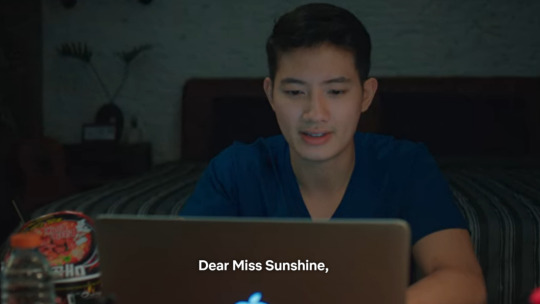
KUHHGDKJHGKJDHGKJHSJDKHG Horny Ghost has now possessed Jiw and has just THROWN SUN TO THE GROUND for trying to root through her purse for the storage room key
My guess is that the Horny Ghost will try to get with Sun the Executive Chef, while inhabiting Jiw’s body Greed-from-FMAB-style
Ep 2: Horny Ghost is attempting to figure out what Jiw's job is in this restaurant while still impersonating/possessing her
Barely ten minutes in and she has already challenged the sous-chef to a fight
Horny Ghost’s only priorities are fucking and fighting

God it's so hard get through this show it's too embarrassing
POOR JIWWWWWW SHE DOES NOT DESERVE TO HAVE THIS PERSON IN CHARGE OF HER BODY JGHKJHG
Jiw has been saved from further embarrassment because Sun has been taken into the police station. Bc he firmly escorted a food blogger out of his restaurant in ep 1 for yelling at his staff and now she's filing false charges against him. Whack
Why is there a shower in the back of this restaurant??? I was willing to accept the lockers for their stuff but the shower perplexes me. Was this building formerly a gym??
And yeah I don't know if I'll make it through this whole show bc I have to pause every minute or two to be embarrassed
TOOK 1 MINUTE FOR JIW TO SHOW UP IN THE SHOWER
I feel all of these emotions

Horny Ghost!Jiw is taking Handsome Study-Abroad Win on a date; I feel bad for both Jiw and Win bc I think they have a vibe going on hgkjhgjh
Executive Chef Sun is solving his B Plot problems by leaving fake positive reviews about his own restaurant
Sun is mad at his mom for settling his legal dispute bc she wasn't there when he was a Sad Little Rich Boy (Now he is simply a Mad Tall Rich Man)
I keep forgetting that the Sous Chef's name is Rain; hgkjhgkjhg I wonder if Sun hired him for the comedy of it
Oh with added context Sun and his mom had a rough go of it actually, she had him young and sent his sister to live with their aunt and kind of really did leave Sun to fend for himself
SUN MADE A FRIEND

Sun's mom and Horny Ghost's Nemesis (Auntie Pu) are hanging out bc Sun's mom is very superstitious

Also dear god these episodes are each an hour long???
An earlier sidenote: There was a scene where Auntie Pu seemed to be heckled by God for her inability to catch Horny Ghost
Executive Chef Sun is now shooting a cooking competition and Rain has been thrown out by security so I'm guessing that Sun and Horny Ghost will be ✨ live ✨ on ✨ television ✨

So the theme of the cooking competition is Mom's Home Cooking and they've mentioned like 3 times that Sun's mom never cooked anything for him
I know this is supposed to be a sad moment for Sun but I'm cracking up bc he reacted like he'd just been shot kghkjgh

Horny Ghost is helppppppppppppppppping!!!!!!!!!!!!!!!!!
Oh noooooooo the sad old man restaurant owner having a hard time with his business who they occasionally cut to is Horny Ghost's dad, it seems!!

You know, ironically even though the other Thai media I've watched has been set mostly coming of age/university stories, this is the first thing aside from Love of Siam that has put such emphasis on the parents. Most other media has been ‘1-2 parent scenes in the whole thing is enough’
HORNY GHOST HAS REGAINED SOME OF HER MEMORIES AND NOW HAS A NAME!!!!!!!!!!!!!!! HER DAD CALLS HER 'KAOPOON'
Awww Dad's Restaurant used to be so bustling with life when Kaopoon was still alive 💔
Kaopoon's obnoxious personality really suited her old life!!
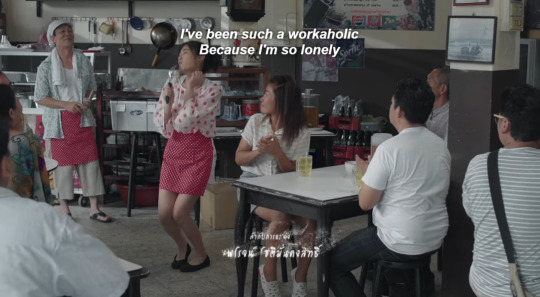
What an unexpected turn towards sincerity and emotional depth
In more light-hearted news, Sun is still vain as hell

Also shout-out to Thailand for the adult orthodontics representation kjhkgjh I noticed this in 2gether as well, it seems a p common thing
Kaopoon has made the bold choice of hanging out of with her dad and snooping through her old room. I can only imagine this will lead to a fight with her brother, bc she has Jiw's face
OH MY GOD KAOPOON HAS BEEN STEALING FROM SUN'S RESTAURANT TO GIVE STUFF TO HER DAD'S RESTAURANT KJHFKHGK
Another ongoing subplot mildly stressing me out: Sun's sister Nam is married to a policeman and it turns out that Kaopoon used to have a crush on him when she was alive and I'm like DON'T FLIRT WITH HIM IN JIW'S BODY PLEASE DON'T NAM IS HER FRIEND
Sous Chef Rain is being a real bro to Horny Ghost Kaopoon and saying “We should all be held responsible so we don't lose our trust in each other” to which Executive Chef Sun says “that makes you a thief,” bc being rich makes u lose empathy I guess lmao
🎶 This is I why do not trust the Bourgeoisie 🎶

Executive Chef Sun is now expressing his regret for firing his Sous Chef to his dog, who, while doing nothing but eat, has stolen the scene and any of my sympathy
Whoops Horny Ghost's brother is about to reveal her Restaurant Crimes to her boss, I'm pretty sure
I hate that Horny Ghost's brother keeps insinuating that Horny Ghost/Jiw is seeking a “sugar d*ddy” or flirting like can't people just be nice jghjkg? I hope that Sun realizes now that family or not, she was being kind, not stealing for self-gain
This is so fucking funny Sun found out about Jiw/Horny Ghost's restaurant crimes, seemingly forgave her on the spot for no good reason, and hired Sous Chef Rain back only for the rest of the restaurant staff to immediately begin muttering about how much they hated Rain hahaha
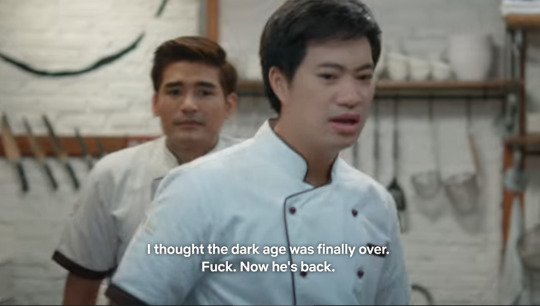
I'm beginning to think Sous Chef Rain has a weird passive-aggressive crush on Executive Chef Sun. I would support it only bc I find them both exhausting and the comedy of two people named Sun and Rain falling in love is great
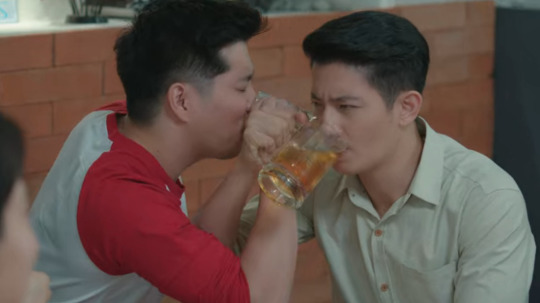
Rain: We have a strong bond. Stronger than friends, family or brothers. Sun, and also me: 👀🤔
“I helped you fix things with Rain,” said Horny Ghost Kaopoon, as if she had not also been one of several sources of conflict at her restaurant. (Also this dialogue is part of her drunkenly coming onto Sun.. which is quite something to watch)
Study-Aboard Win Who Probably Has Feelings for Real Jiw to the rescue
God, who has the mental strength to get through show all at once? Really and genuinely every time this show gives me a false sense of normalcy they do something embarrassing dhfjhfjk where is the pay-off? Where is the romance??
Sun's childhood friend Ida who seems to have a crush on him tried to invite him up to her apartment [Tiktok voice "I wanna ruin our friendship"] but he said nah so now he's standing in the rain thinking about their history
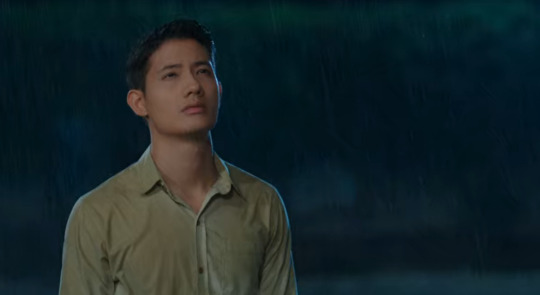
First of all, sir, you are 30, so I don’t see the point of trying to pretend the same actor makes sense in a school uniform. Second of all, is wearing glasses and having bangs all that it takes to make you unpopular? What kinda She's All That nonsense??
Sun's argument for denying the booty call is that they should've dated in university but now they've missed their moment
Horny Ghost has just found out her Cop Crush is married (to Sun's sister) and Sun has just rejected himself from the Friendship Booty Call, so I wonder if they're going to have Sad Sex in the Rain
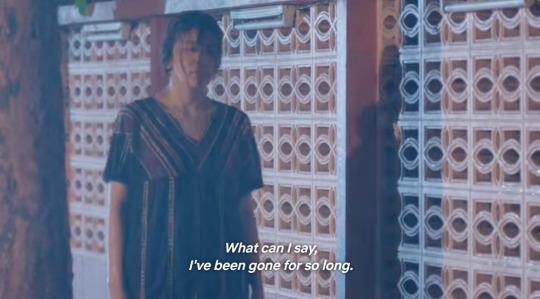
Update: No one is having sex in the rain but Horny Ghost Kaopoon has just been kicked out of her apartment and is now going to sleep in the restaurant I guess, this should end well
Sun definitely has a weird crush on Horny Ghost bc he keeps letting her get away with all kinds of shit kjhgkhgkgh she has punched him, stole from him, come onto him strongly, and snuck into the restaurant at night and she's just like “~~please chef 🥺” and he's like “FINE 😤😊 you can do whatever I guess”
That said despite taking it fine he did not let her stay the night at the restaurant so I guess that's the one thing she's not allowed to do jghkhgg
Uhhhhhh it seems like the Cop Crush is reciprocated???????? Kaopoon/Jiw was like “You must love her a lot” and he was like “who” ABOUT HIS WIFE!!!
Sun has gotten caught up with Jealousy Antics towards Childhood Friend Ida and now Kaopoon is attempting to blackmail him to let her stay at the restaurant lmaooo
Okay Win his definitely in love with ONE of the two (Sun or Jiw/Kaopoon) bc Jiw/Kaopoon slept in the restaurant and everyone's like “Oooooh Chef and Jiw got lucky last night” and they had a lingering shot of Win looking longingly in their direction

AHHHHHHHHHHHHHHHHHHHHH Sun just kissed Jiw/Kaopoon bc of a fever-induced hallucination I bet u $85 that Ida is about to walk in
Kaopoon has confirmed that Sun is Ghost-fucking Proof and now she's 100% Mission Sleep with My Possessee's Boss Before I Get Turned Into an Evil Spirit in Two Months
She just straight up asked him, “Will you do it with me? Just once?”
Sun, emotionally, at this particular moment: [Donkey Kong meme]
(As an aside I really wish Kaopoon were not up in everyone's grill romantic advance-wise this is straight up worse than an anime in that sense)
Oh my god is this how they actually become friends?????? By her chasing him around asking him to fuck and him going “NO” and then physically rolling her away from him
I DON'T UNDERSTAND YOUR DYNAMIC!!!!!!!! WHY IS THIS WEIRD FUCK-PROPOSITION MONTAGE SET TO SUCH PEPPY MUSIC
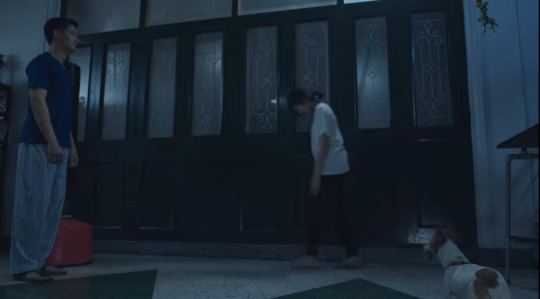
I have now pivoted and I think Cop Crush may have murdered Kaopoon???????? Auntie Pu (Horny Ghost Kaopoon's Nemesis) just said his identity was death and suspicious music played
OH MY GOD FOR SOME REASON SUN UNPLUGGING HIS PHONE CHARGER HAD THE COSMIC EFFECT OF REMOVING HORNY GHOST FROM JIW'S BODY???? WHAT!! WHAT!!!!!!!!
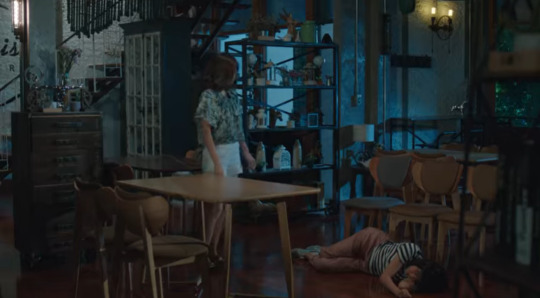
Every time I think "that's it, I'm done with this" they keep pulling me back in!!!
DGhfjdkjk?!!!!!!!!!!!!!!!!!!!!! They just made Cop Crush run over an unhoused man's recycling??? I guess to establish that we shouldn't trust him??? What is the writing on this show!!
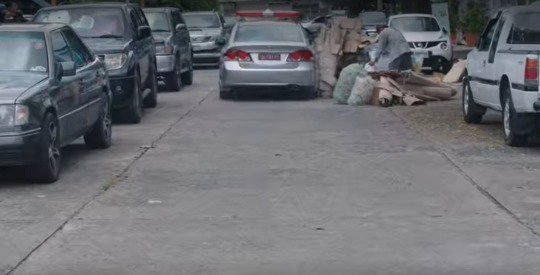
Dkjhgsdkjhgkjh a Canadian character has appeared for some wonderfully stilted English dialogue:
Sun: How's Canada sir?
Canadian Ambassador: Canada was very cold, but it's good to be back
Sun: It sounds like fun anyway!
CA: It is! It's always fun!
Sun: Ok!
JIW HAS ACCIDENTALLY SET FIRE TO THE BACK OF THE RESTAURANT AHHHHHHHHHHHHHHHHHHHHHHHHHHHHHHHHHHHHHHHHHHHHHHHHHHHHHHHHHHHHHHHHHHHHHHHHHHHHHHHHHHHHHHHHHHHHHHHHHHHHHHHHHHHHHHHHHHHHHHHHHHHHHHHHHHHHHHHHHHHHHHH
I figure if I power through the show the psychic damage will be shorter term
Also I think Sun has accosted Real Jiw for a psychiatric evaluation bc of her reasonably erratic behaviour
To add to the layers of this show, Jiw and Sun are back to interacting via her recipe blog and he's all like “wow this internet gal is my soulmate 😍“ like the dumbass he is
Not to detract from internet relationships or anything, but they've exchanged ONE comment
They're having at least a minute long back and forth of cutting to these two staring stupidly into the distance thinking about each other
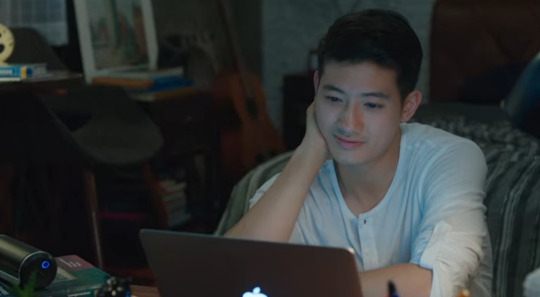
Kaopoon's father seems to have alcohol poisoning and Cop Crush just left him in the back storage closet on the ground????????????? Heavy-handed murder foreshadowing I think
Kaopoon saved her dad by possessing Jiw again; as much as I understand why she did it I really do feel bad for Jiw bc Kaopoon keeps living her life for her, you know? Seems unkind
Sun just offered to train Jiw/Kaopoon to be a chef (which Jiw really would want to do) but will Jiw be present for it? Hard to say!
SURE YOU WERE LIEUTENANT MURDER
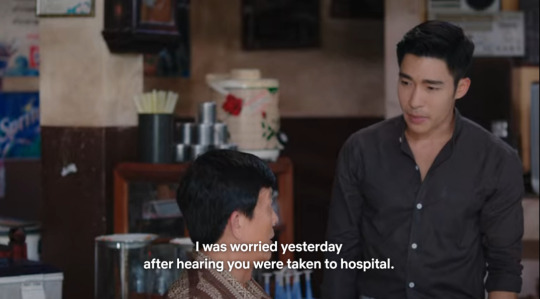
It's been narratively established that Jiw does not remember what happens while she's been possessed so it makes the possessions that much sadder. Particularly since everyone but Win seems to like Kaopoon better
Bc this show needs at least four dramatic plots per episode, Sun has invited his childhood bullies to his restaurant to mock them passive-aggressively with his wealth

The bullies are like: Hey Sun, your childhood trauma's really harshing the vibe
Sun found out his Main Bully (Big) is really not doing well income-wise and now he feels slightly bad for mocking him with his wealth
Clearly Sun has not caught onto the Horny Ghost Situation

Oh my GOD “I spring up every time you talk horny because I’m scared of your words” Sun really said: ‘Well mark me down as a scared AND horny’
Auntie Pu whacked Horny Ghost out of Jiw on the way to their Spring Roll Not-Date so Jiw will finally get to experience some chef stuff with Sun
Sun, despite his reservations, seems to have a crush on all of Jiw's various personalities
He's playing guitar for Jiw through their shared apartment wall just bc she stopped on the street bc she saw a guitar player 🥺❤️

Real Jiw really likes him!! This is the Thai Jamie Oliver bullshit I signed up for
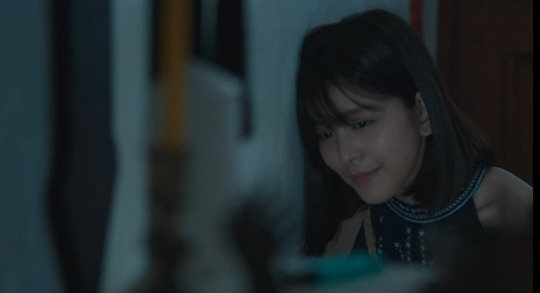
SCREAM he's trying to take Real Jiw on a bike ride kjhgkjhgkh what a quit pivot from his standoffishness to “I will be involved in every aspect of your life”
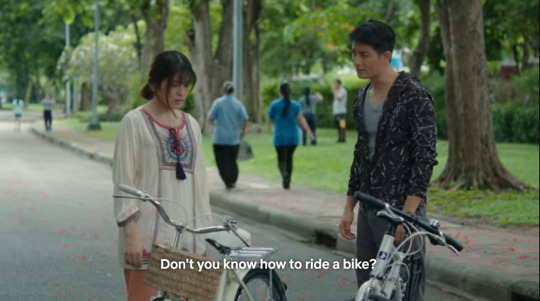
This biking day concluded in a way I could not have possibly predicted which was, as an interruption to their flirting, they had to high-speed foot chase a bicycle part thief, which they caught because Real Jiw BIT HIM on the leg
And Sun, because he is OUT OF HIS MIND, is just kinda like: “Love that for you babe 🥰”
OKAY SUN YOU MAY HAVE ONE (1) BOURGEOSIE PASS
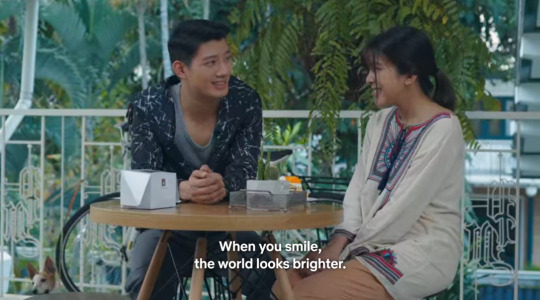
The Jiw/Sun/Ida stuff finally comes to a head because Ida brought him a cake but Jiw and Sun are already sharing a cake (and restaurant-apartment building)
“Think of it as... helping a hungry policeman” EVERYTHING THIS MAN DOES IS SO FREAKING SUSPICIOUS
Somehow I don't think this is a reasonable request, Kaopoon

Things have escalated and now Auntie Pu, Kaopoon and Jiw are all on Team Sun Should Have Sex with Horny Ghost
I'm gonna power through as much of this show as I can at once so on it goes lol
I kind of understand Sun's "I'm not going to deal with this" way of approaching romance but man it sucks to be Ida who has tried to be pretty forthright with her feelings
So apparently Sun's sister Nam has not always had a wheelchair, she only had it starting three years ago, which is when Kaopoon died,,,,, did Cop Crush murder Kaopoon AND injure his wife,,,,, the stank vibes!!!
As weird as it is that Kaopoon and Jiw are working together to seduce Sun, it's exactly what I wanted and thought this show would be from the beginning

Win said all women are queens 😌❤️
Rain: Why are you protecting [Jiw as Kaopoon]? Is she your girlfriend or something?
Win: Do I need to be her boyfriend to do that? Fine, I'll be her boyfriend then
Sun purposely did not give Win the prize in their Friendly Vacation Cooking Competition because he is jealous that Jiw and Win seem to be flirting; this man said my love language is Passive Aggression
They're going on yet another couple's bike ride (this time ft. Horny Ghost Jiw, which Sun simply canonically thinks is a product of mania, which is fair I guess)
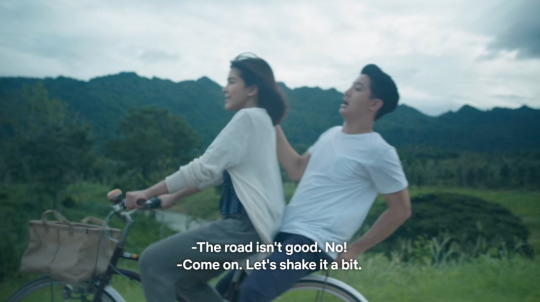
Nam's friends are talking about the person who did a hit and run to Nam getting karmic justice while Lieutenant Murder sits there, probably the one that did it
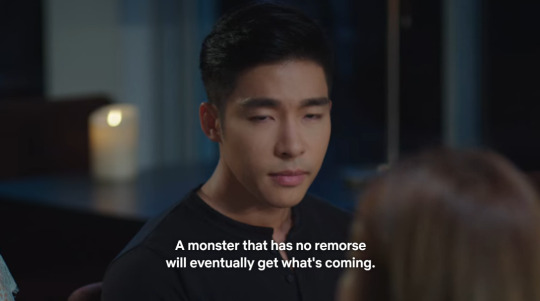
Lieutenant Murder (formerly known as Cop Crush) just keyed his wife's friend's car because they need to establish that he is not only evil, but also a run-of-the-mill dick
Gsdkdhgkhgkh Kaopoon as Jiw has been trapped inside a storage crate by a tween girl who can see ghosts and u can this is set in Thailand (or Asia generally) bc they cut to this temp gauge like 10C is a really threatening temp. Girl it's chilly but you are fine!!
Sun said, "I am in love with all sides of Jiw, Aggressive Horny Ghost I Think Is Mania included"

#ayesha says things#ayesha liveblogs oh my ghost#liveblogging#oh my ghost 2018#thai television#television#long post
2 notes
·
View notes
Text
Hard-Boiled Fantasy
So a conversation from @firefly124-writing about the TV show Supernatural and where it exists in relation to horror got me to wondering about the origins and trappings of what we now consider the “urban fantasy” genre, which I realized I haven’t really dug that deeply into before.
That sounded like a fun rabbit hole to fall down, so I figured I’d do a bit of digging!
So the initial question was: Is Supernatural a horror show?
It kind of seems like it should be, right? There’s ghosts and demons and all manner of other things that go bump in the night.
But structurally, it sure doesn’t seem like a horror. In horror stories, the monsters usually hunt the characters, not vice versa. And the story beats are all wrong. In fact, if you subbed out monsters for regular criminals, you’d pretty much just have a crime drama.
And in that respect, Supernatural is hardly on its own. In fact, there’s a ton of supernatural crime fiction - from Laurell K. Hamilton’s Anita Blake series, to Jim Butcher’s Dresden Files, to Angel (not so much Buffy, more on that in a minute) and many, many more besides. In fact, the whole genre of “urban fantasy” seems to have some hefty overlap with supernatural crime stories – but are the two interchangeable? Or is there more to it?

First Off: What the Heck is Urban Fantasy?
Our benevolent overlords at Barnes & Noble compiled a handy list of recommendations for Urban Fantasy series (https://www.barnesandnoble.com/blog/sci-fi-fantasy/12-urban-fantasy-series-to-binge-read/), and looking at them side-by-side, we can begin to see some trends:
Super-powered and/or badass main characters
Serial format that lends itself to a “monster of the week” type storyline
Crimes and/or supernatural political intrigue
But are they, like, the defining traits of the genre? Let’s investigate further..
According to this article from Writer’s Digest, there are a few key ingredients: setting as character, a central mystery, character-driven story (often in first person narration), and a romance subplot - https://www.writersdigest.com/online-editor/5-elements-urban-fantasy-novels-must
But I take some issue with that. I think there are a fair number of stories that feel like they should qualify as “urban fantasy” without ticking off all of those boxes. Setting aside everything that could be considered “paranormal romance” - your Twilight and True Blood and whatnot (Buffy slots here better, maybe)- there’s still plenty of things that seem like they should be urban fantasy, like Neil Gaiman’s Neverwhere or Lev Grossman’s The Magicians or Charles de Lint’s Newford series, or War for the Oaks by Emma Bull.
But it’s OK - urban fantasy is large, it can contain multitudes.
The real question is, why is so much of it just supernaturally flavored crime fiction?
The Origins of Crime Fiction
Crime fiction/mystery/thriller is the second-most popular book genre, coming in right behind romance for sales: https://bookstr.com/article/book-genres-that-make-the-most-money/
With that in mind, it kind of makes sense that you’d want to fold crime fiction elements into other types of stories. A genre that popular and ubiquitous is going to have lots of familiar tropes and appeal to a lot of people.
And as it turns out, crime fiction has its roots tangled quite deeply with horror fiction – so deep, in fact, that the granddaddy of all detective stories is none other than Edgar Allan Poe.
Poe’s character C. Auguste Dupin – from famed stories like “The Purloined Letter” and “The Murders in the Rue Morgue” – lays down the template for detective stories in the 1840s, from the eccentric gentleman of leisure turned detective to the impossible crimes explained by the power of deductive reasoning. That template would then be lifted almost wholesale by Arthur Conan Doyle in the 1880s with his Sherlock Holmes stories.
And, really, it shouldn’t be a particular shock that detective stories started to really take root in this time period. In a post-Enlightenment world, we were collectively struggling with our relationship to nature, science, industry and the mysteries of the universe. Even as we continued to fear things that went bump in the night, we increasingly sought to rationalize it all.
There was also, of course, more crime – and, thanks to developments in both city living and news reporting, people were aware of those crimes. Jack the Ripper captured public imagination and inspired terror with his murders in 1888, about the same time as H.H. Holmes was running his murder hotel in the United States.
So with that in mind, is it any surprise that crime fiction entered its first Golden Age in the 1920s and 30s – a time when organized crime was at its peak thanks to Prohibition?
What is especially interesting to me is that even as horror waned in popularity in the 1940s and 50s, crime fiction was entering a second Golden Age thanks to Film Noir and all of its now-familiar tropes – from world-weary detectives to beautiful dames in trouble and rain-drenched streets.
Some reading you may find interesting on that topic, especially in regards to how the Noir genre survived the Hays Code: http://hayscodeandfilmnoir.blogspot.com/ and https://vicolablog.wordpress.com/2017/06/05/film-noir-and-the-hays-code/
Putting it All Together
So with this historical context firmly in mind, I think we can make a few logical conclusions.
First, I think it’s safe to say that people like crime stories because they tap into cultural fears and fascinations – crime is something that we are all aware of but which most of us have fairly little hands-on experience with, so it’s only natural that we’d be morbidly curious about it. Crime is interesting because it’s dangerous and taboo, and that makes for good storytelling.
Second, it also seems safe to say that many people prefer crime stories to horror stories because they are more comfortable to consume:
The hero is usually empowered rather than powerless
Justice is usually served at the end (whereas horror tends to have a bleak outlook)
The overall feeling can be fun/adventurous/even silly and largely safe, despite the presence of a murder – see the entirety of the “cozy mystery” genre
Mysteries tap into a puzzle-solving, intellectual aspect of the audience as opposed to a visceral/primal response
Now obviously these lines are drawn in ever-shifting sands. There are plenty of horror stories that are primarily intellectual, and crime fiction can be plenty bloody and visceral. And that’s not even touching on the cross-overs like Thomas Harris’s work or the entirety of giallo filmmaking: https://vicolablog.wordpress.com/2017/06/05/film-noir-and-the-hays-code/
But by and large, speaking in general terms, I think we can make an argument that there is probably a somewhat wider audience for crime/detective stories than for horror specifically because the intended purpose of horror is to make the reader/viewer uncomfortable, and a whole lot of people dislike feeling uncomfortable.
So with all of that in mind, I don’t think it’s too much of a leap at all to see how our modern understanding of urban fantasy as a supernatural crime thriller got its start.
By taking familiar horror tropes that have slipped into pop culture – monsters and demons and zombies and whatnot – and then folding them into the comforting tropes and narratives of popular crime fiction, creators can delve into everything that is cool about horror without the icky, alienating bits that make people feel bad.
(I’d also posit that this type of storytelling is gaining an increasingly powerful foothold in modern times because it side-steps some of the more problematic aspects of realistic crime fiction – ie, the socio-economic status of most criminals, the corruption of the legal system, etc. By making fantastical creatures the perpetrators, we can skip the discomfort of due process and human rights and focus on the fun parts of solving crimes with a clear conscience)
But that’s just one opinion, from an admittedly biased horror blogger. I’ll leave you with this final essay on the topic, which follows a similar path and draws a different (but quite interesting) conclusion – https://carriev.wordpress.com/2012/04/16/the-long-and-diverse-history-of-urban-fantasy/
PS - if you like these deep dives and want to support me in doing more of them, don’t forget to drop a tip in my tip jar: Ko-fi.com/A57355UN
174 notes
·
View notes
Text
Blog For You
Jeffery Zeldman, one one of the country’s leading web designers, wrote this morning about continuing to learn, and in the process nailed what I see blogging as all about.
When I shared what I was learning, by writing about it—when I learned what I was learning by teaching it—I felt euphoric. We were at the dawn of a new kind of information age: one that came from the people, and to which anyone could contribute merely by learning a few simple HTML elements. It was going to be great. And democratic. And empowering. Our tech would uplift the whole suffering world.
Zeldman’s been blogging, in various formats, about tech and development for decades. Yet the concept of blogging Zeldman speaks of is the same for legal professionals.
Blogging may just be the best way to learn you have at your disposal. After all, many of the the better legal bloggers are not blogging to show off intellect, intellect being more of a commodity than legal professionals believe. They’re sharing what they are learning, as away of learning in and of itself.
Blog what you’re reading and following. Share your take – “I share this because” or “I took this from what she’s saying here.”
What Zeldman was learning years ago was not easy, but the years have masked the pain. Most importantly, Zeldman was blogging and learning for a noble reason – himself.
Most of all, I falsely remember it being easy to learn HTML, CSS, and Photoshop because I wanted to learn those things. I was doing it for me, not for a job, and certainly not to keep up.
I was a pioneer—we all were, back then. I was passionate about the possibilities of the web and eager to contribute.
Back in 2004, I had not a clue what SEO (search engine optimization) was all about. Listening to someone speak about SEO made me nauseous. It was too hard, I’d never be able to learn how it worked.
But I was starting a blogging company for lawyers as a way for lawyers to connect with real people in a real and authentic way. Something I believed then, and still do was needed for people to find and trust a good lawyer. I needed to know SEO.
This cause drove me to Barnes and Noble where I picked up SEO for Dummies. Over a July 4th weekend, I read the book twice and outlined what I learned. Finally I blogged what I was learning in a series of posts.
Reading and outlining was good, but the blogging part which meant reading again what I was going to share, thinking about what I was going to blog, relaying it through my fingers on the keyboard and then reviewing/editing my copy on the screen was the best form of learning. The knowledge of SEO that has stuck with me to this day.
Zeldman says the same more succinctly.
With every new discovery I made and shared, I felt a sense of mastery and control, and a tingling certainty that I was physically contributing to a better world of the near-future. A world forged in the best tech ever: simple, human-readable HTML.
With age, 23 years since I started sharing online what I was reading, comes the continuing need to blog for learning. Blogging is not just for the new associates or junior associates looking to build a book of business
At my age, change comes harder than it used to. Guess what? That means I need to change, not just to do my job; I need to change to stay young. (No, that’s not science, but yes, it works.) When it’s hard to move, you need to start exercising, even if starting is hard. When you’re trapped in a dead-end relationship, it’s time to say goodbye, even though breaking up is sad and scary and hard as hell. And if you work in tech and find yourself thinking your past learning gets you off the hook from having to learn new things, you need to think again.
Learning new things is hard, and it gets harder if you’re rusty at it, but it gets easier if you keep at it. Or so I tell myself, and my friends tell me.
Blogging can be tough, but you can do it – if the cause is strong enough – you.
And what Zeldman says about learning development, learning blogging can be done.
You can do this, because I can, and I’m more stubborn and more full of myself than you ever were.
So to my old-school sisters and brothers in HTML. If you’re struggling to learn new things today so you can do your job better tomorrow, I’m going to tell you what a friend told me this morning:
“You got this.”
Blogging 15 years ago came easy to me. I was building a company, a company that I thought could bring real positive change to the legal industry.
I shared what I was learning about – as I sure as heck didn’t know anything about blogging at the time.
Blogging was a conversation, people I referenced in my blog posts provided their take in response on their blog. Like Zeldman says, it was the dawn of a new information age, a democratic one where everyone could participate. We were all learning together. It was easy to be excited.
Social media, when used poorly, and blogging for content marketing have since created a lot of noise. People who have little interest in using the Internet share what they are learning to advance causes
But blogging for you, and me, – to learn, to find out what we know still works.
I need to get on the wagon more often. So do you.
Blog For You published first on https://personalinjuryattorneyphiladelphiablog.wordpress.com/
1 note
·
View note
Text
Better Call Saul Rewatch, Part 1/30: They Called Him Slippin’ Jimmy
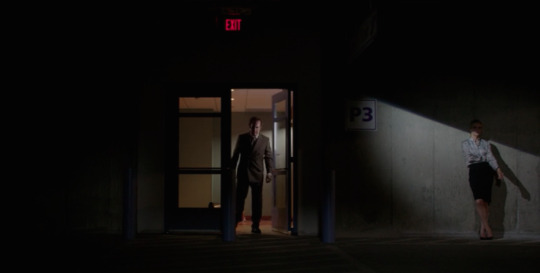
Late last month, I decided to rewatch all of BCS and post about it, one episode at a time, every day during the 30 days leading up to the premiere. The elements of this plan that proved problematic were “post” and “one episode at a time”, but we’ve still got three weeks, so let’s do this. I’m not much of a critic; this is going to be mostly just a bundle of thoughts and observations. There will also be a key to references in the dialogue, notes on locations and the timeline, and probably a lot of gushing over beautiful frames, because there are many (see above! look at that! look at it!!!). The tag will be #bcs rewatch, for your following/blocking needs.
Uno (Season 1, Episode 1)
Written by Vince Gilligan & Peter Gould / Directed by Vince Gilligan
If the Cinnabon sequence constitutes fanservice, I don’t care, because it’s brilliant.

BCS uses a lot of intense chiaroscuro, and it starts in the scene at Gene’s apartment. Details— the ice in the glass, the white label on the bottle of Scotch— are highlighted, the rest of the picture is subdued. There’s also a gorgeous softness to the black-and-white images. Overheard on the TV as Gene pours: a woman cheerily saying “Well, from time to time, people make mistakes, that’s okay!”
There’s a bit of Breaking Bad-style handheld camera here, which stands out because it’s mostly absent from the rest of the show. In Gene’s living room we have the first appearance of glass block windows, about which blogger Marc Valdez wrote an excellent piece (Streamline Moderne and Jimmy McGill).
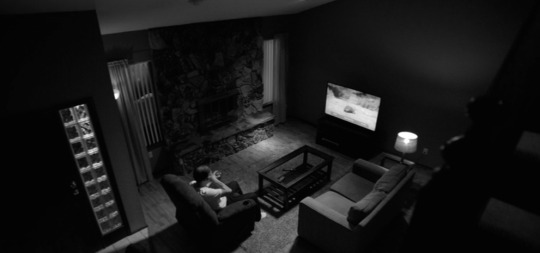
“No charge is too big for me!” says Saul, on the tape that Gene is watching in hiding with his blinds closed. :(
(In this episode, Jimmy’s personae are introduced in reverse chronological order: first Gene, then Saul Goodman, then James M. McGill Esquire, then Slippin’ Jimmy.)
It’s May 13, 2002, and the courtroom scene— beautifully paced, by the way— is one of the most distinctly Vince Gilligan scenes that ever Vince Gilliganed. The stenographer loudly slurping on her Big Gulp, the attorney using her legal pad to draw a shirtless man on a unicorn, the prosecutor silently wheeling in the TV in response to Jimmy’s argument, and most of all, the horrifying punchline.

When we first encounter Jimmy— as opposed to Gene or Saul— he’s pacing in the men’s room, muttering about how people shouldn’t be punished for whatever stupid things they did when they were young. Hmm. The three defendants sit there, chastened and nervous in ill-fitting ties, as Jimmy does an excellent job of talking around what it is they actually did. No one got hurt! It wasn’t trespassing, the business was open day and night! “I don’t think they deserve to have their bright futures ruined by a momentary, minute, never-to-be-repeated lapse in judgment,” he tells the jury.
I’m jumping ahead here, but where do you think Jimmy would have ended up if the whole Chicago sunroof incident never happened? I mean, he wouldn’t have gone to Albuquerque, he wouldn’t have become a lawyer… do you think he was happy just running small-time cons and smoking weed at age c. 30?
Anyway, as soon as we see the boys in the mortuary, let alone hear the sawing, we know the case is unwinnable. Jimmy collects his meagre paycheck and stalks out to his car. The show teases us a bit by putting a white pearlescent Cadillac front and centre in the frame before panning across to a battered 1998 Suzuki Esteem (aside: that car is awfully beat up for being only four years old). I love the car, by the way. The colour and the mismatched door are perfect.
The Kettlemans, who could have stepped straight out of an episode of Fargo (as Julie Ann Emery in fact did!), introduce the theme of denial of reality. They’re the innocent victims of a misunderstanding, you see. Craig’s business practices are “beyond reproach”. The missing money is a “discrepancy”. While Craig is amenable to hiring Jimmy, Betsy won’t have it; needing a lawyer would imply guilt, after all. Bob Odenkirk plays Jimmy’s barely-hidden desperation very well. He looks literally and figuratively hungry as Craig prepares to sign.
I want to take a moment to comment on Dave Porter’s score, which helps set Better Call Saul apart from Breaking Bad. The two scores are similar enough to provide continuity, but where Breaking Bad’s music is full of mechanical sounds, drones, saws and reverberations, the music of Better Call Saul has a much warmer timbre, more traditional instrumentation and a more naturalistic sound. (The best side-by-side comparison I can think of is “Dead Freight” versus “Border Crossing”— similar themes, similar rhythm and tempo, completely different feels.) The use of flute and harp stands out in particular— you’d never hear those instruments used in the same way in an episode of Breaking Bad.
One of this episode’s most effective individual beats is Cal coming out of nowhere and hitting Jimmy’s windshield, which manages to be startling even when you know it’s coming. It’s the distraction factor: preoccupy the audience with new information (Jimmy’s card was declined) and then fling a skateboarder into the frame. Jimmy, his windshield broken (can we call that a Breaking Bad reference?), limps home.
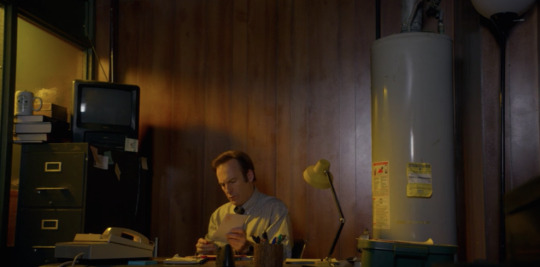
The lighting in Jimmy’s office is just gorgeous. This show unreasonably romanticises broke lawyers living in salon backrooms. We learn that Jimmy has a host of “past due” bills— wireless, Visa, library, Diner’s Club, phone— and then get a brilliant hook in the form of a check for $26,000 (dated May 9, 2002, for those of us tracking this stuff) that he promptly rips up, scowling.
Everything about the offices of Hamlin, Hamlin & McGill is so composed, right down to the five-note elevator chime. Blue and wood panelling predominate. I’ll have more to say about colours later on.
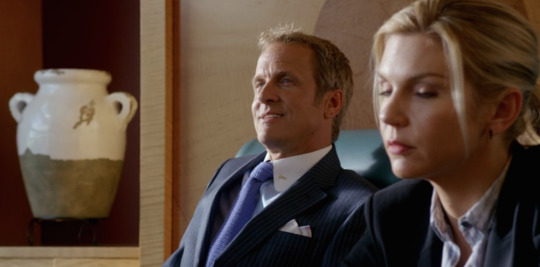
The boardroom scene is a beautiful piece of exposition, establishing characters and relationships bit by bit without spelling anything out. Chuck is someone close to Jimmy, and Hamlin, a senior partner at HHM, is giving Chuck money. He’s paying it into Jimmy’s account because Chuck isn’t capable of going to the bank, for some reason. Chuck helped build the firm, but he doesn’t work there any more and Jimmy thinks he never will again. Hamlin, on the other hand, believes Chuck can overcome his situation, and Jimmy dodges the question when asked whether Chuck really wants to be cashed out. The words “brother” and “illness” aren’t even used.
“If Chuck can call this an extended sabbatical, so can we”, Hamlin says— it’s not just Betsy Kettleman who’s engaging in a degree of denial (though the whole situation with Hamlin and Chuck’s illness becomes much more shaded and more complicated later on).
Let’s take another look at this incredible frame:
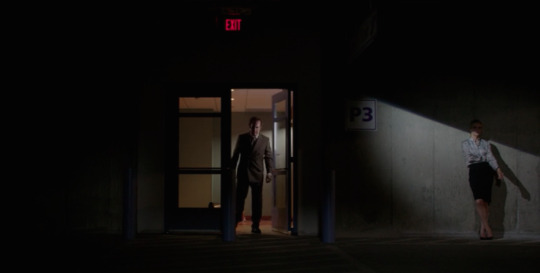
Kim and Jimmy share a cigarette. Seven words are spoken. Thus, their relationship is sketched out. See above re: exposition. We also see Kim literally clearing up after Jimmy after he takes his frustration out on the trash can, illustrating how they respectively deal with unfairness; he lashes out, she sets things straight.
Again in darkness, Jimmy arrives at Chuck’s house, stashes his phone and keys in the mailbox, and grounds himself on a piece of metal. (The air in Albuquerque is so dry that it’s very easy to build up a static charge. I was constantly getting zapped by door handles.) Chuck, noticing Jimmy’s discontent, instinctively asks him if he’s “in trouble”, which must sting.
Good Lord the lighting is beautiful.
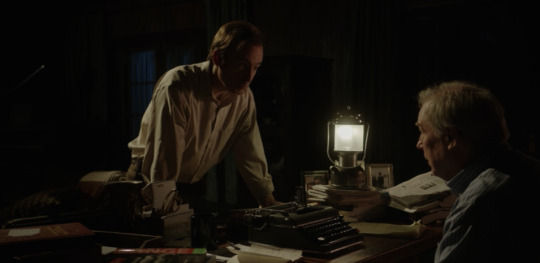
Chuck does have a point about what would happen if he were to cash out of HHM. Jimmy doesn’t seem to see past the initial payout. What they’re really arguing about, beyond money, is whether or not Chuck is ever going to recover from his unspecified illness. The way his voice breaks on “I’m going to get better!” is rough.
“Your friend Kim— a promising career, over and done with.” Not to read too much into this phrasing, but it sounds almost like Chuck thinks that if Kim lost her job at HHM it would be the end of her entire career. As if the firm is only keeping her there out of charity.
“But Jimmy, wouldn’t you rather build your own identity?” Oh, Chuck, if you only knew.
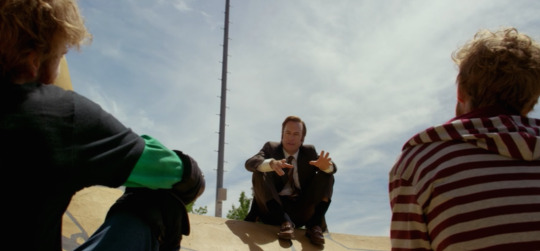
The next scene plunges us into sunlight. Jimmy has tracked down the skateboarders and we get a foundational piece of his backstory: he used to make money running slip-and-fall scams on the icy sidewalks of his hometown, and now he wants the boys to take a hit from Betsy Kettleman so that he can parachute into her good graces. Jimmy, apparently, has been observing Betsy closely enough that he knows where her kids go to school, what time she leaves to pick them up, and what route she takes. I mean, okay.
The hit-and-run happens at 7th Street and Tijeras Avenue, very close to the school where Jimmy & crew film the flag in season 2, and a short distance west of the courthouse district and the Civic Plaza. This whole sequence is such a glorious comedy of errors, and it showcases perfectly Jimmy’s ability to think on his feet. I mean, it’s also true that if he’d aborted the plan when “Betsy Kettleman” had driven off, he never would have ended up hog-tied in the desert pleading for his life, but those are unknown unknowns, I suppose.
“You felonied my brother!" is possibly one of my favourite lines of the season.
Who among us saw Tuco coming? None. None of us. I gasped. It was very considerate of the show to release the next episode immediately.
Miscellaneous
While most of the addresses shown on screen in BCS are fictionalised, the address shown on Jimmy’s mail—160 Juan Tabo Boulevard NE— is the actual IRL location of the nail salon.
Items in Gene’s shoebox: the videotape, an old Band-Aid container, various photos including one of a man standing in front of a 1940s-style car, and a photo packet from a film lab in Portland, Maine
Broken windshields: 2
New Mexico Statutes violated: 3— § 30-28-2, conspiracy to commit felony fraud (Jimmy, Cal and Lars); § 66-7-202, failing to stop after an accident causing damage to a vehicle (Mrs. Salamanca); § 30-3-2, aggravated assault (Tuco)
Timeframe: May 13 to May 25, 2002 (see next post)
Music
“Address Unknown” by the Ink Spots (1939), during the Cinnabon sequence
“Milestones” by Shook (2014), as the twins attempt to scam Betsy
References
Network: a 1976 film about a news anchor who begins ranting about the state of the world during a broadcast. The character whom Jimmy quotes (”You have meddled with the primal forces of nature...!”) is a man who berates the protagonist for speaking out against his network’s corporate owners. Bryan Cranston starred in the 2017 stage adaptation.
Peter Minuit: a Dutch trader who purchased the island of Manhattan from the Lenape people for a sum equalling about $1,000 in today’s money
“Ergo, a falsis principiis proficisci”: “therefore, you proceed from false principles"
Trichinosis: a parasitic disease most often spread via undercooked pork
Starlight Express: an Andrew Lloyd Webber rock musical performed on rollerskates
> NEXT EPISODE: MIJO
22 notes
·
View notes
Text
Where Has All The Money Gone?
New Post has been published on https://perfectirishgifts.com/where-has-all-the-money-gone/
Where Has All The Money Gone?
The use of cash is going down but the amount of cash out there is going up. Where is it all?
In the UK, a committee of MPs has said that the Bank of England should be trying to track down £50bn of “missing” UK currency. This is about three-quarters of all UK banknotes in existence! So where is all of this missing cash? Is it all being used by money launderers or people bribing government officials to obtain COVID-related contracts or are there more benign explanations?
I am very curious to know where the missing banknotes are, because it’s not only the UK that has lost track of its cash. In a many countries, for many years, the use of cash for purposes such as shopping has been steadily decreasing while the amount of cash “in circulation” has been steadily increasing. This is true in, for example, America and Australia as well as in the UK and Europe.
Down Plunder
Look at Australia as an example. The governor of the Reserve Bank of Australia (RBA), Philip Lowe, pointed out that “there are fourteen $100 notes in issue for every Australian, thirty $50s and seven $20s” before going on to ask where exactly the $3,000 per Aussie is, saying that “I, for one, don’t have anywhere near that amount“. Me neither, although I just checked and I do have A$25 in my travel wallet, so perhaps one explanation is that lots of visitors get some Aussie dollars out at the airport and then discover that they never need them because it’s an advanced nation where everywhere takes contactless and then forget to spend them before they leave. But that can’t account for anything but a tiny fraction of the billions “in circulation”.
The main explanation given by the RBA is that some people choose to hold a share of their wealth in Australian banknotes. The RBA Research Discussion Paper 2018-12 “Where’s the Money‽” says that of the outstanding banknotes some 15-35 per cent are used to facilitate legitimate transactions (I’d actually be surprised if it was ten per cent by now) with the rest hoarded as a store of wealth or for other purposes. These other purposes are:
10-20 percentage points to domestic hoarding (this now seems small to me, given the lack of transactional usage and the ban on cash transactions over $10,000) and up to 15 percentage points to international hoarding (which includes the A$25 in the draw in my study);
4-8 per cent are used in the shadow economy. This seems low, given that more recent figures show that up to A$1 billion is held by drug dealers alone at any one time, and
and 5-10 per cent are lost.
By the way, some good news for the RBA is that some of the missing banknotes turned up. A Mr. Simon Cross was pulled over in Queensland and when the police looked in his car they found $4.35 million in cash ($1.75 million in a suitcase and $2.61 million in a cardboard box). I don’t doubt that Mr. Cross’ preference for cardboard boxes full of cash is legitimate and a wholly reasonable response to the low interest rates currently available on Australian savings accounts.
Cash Categorised
Whether in the America or the United Kingdom or Australia, the use of cash for legitimate activities has been falling while the use of cash for drug dealing, money laundering, tax evasion, payments to corrupt officials and so on has been rising. Banknotes are, statistically, not being used to buy things. Cash is no longer primarily a means of exchange. The latest figures from the Bundesbank show that nine out of every ten euro banknotes issued in Germany are never used in payments but hoarded at home and abroad as a store of value. Not “rarely used”. Not “infrequently used”. Never used. The notes are not in circulation at all but are stuffed under mattresses where they are not even part of the shadow economy.
A few years ago I wrote about the Bank of England’s categorisation of the demand for cash. I found their breakdown help, so I thought it might be helpful to revisit these categories to help with our discussion:
Transactions. Here the trends are clear. Technology is a driver for change but that the impact is weak. In other words, new technology does reduce the amount of cash in circulation, but actually quite slowly. However, as the Bank of England’s quarterly bulletin for November 2020 points out that during the COVID crisis the way people use cash changed. People are spending less cash, but the total value of banknotes in circulation has increased so that the “cash gap” between transactional usage and aggregate demand for banks has widened.
Hoards. These are stores of money legally acquired but held outside of the banking system. If the amount of cash that is being hoarded has been growing then that would tend to indicate that people have lost confidence in formal financial services or are happy to have loss, theft and inflation eat away their store of value while forgoing the safety and security of bank deposits irrespective of the value of the interest paid.
Stashes. These are stores of money illegally acquired or held outside the banking system to facilitate criminal behaviour. Prof. Charles Goodhart (London School of Economics) and Jonathan Ashworth (UK economist at Morgan Stanley MS ), note that the ratio of currency to GDP in the UK has been rising and argue that the rapid growth in the shadow economy has been a key cause. Two rather obvious factors they highlight are the increase in VAT to 20% and the continuing rise in self-employment, both of which serve to reinforce the contribution of cash to the shadow economy.
Exports. The amount of cash that is being exported is hard to calculate, although the Bank itself does comment that the £50 note is “primarily demanded by foreign exchange wholesalers abroad”. I suppose some of this may be transactional use for tourists and business people coming to the UK, and I suppose some of it may be hoarded, but surely the strong suspicion must be that at lot of these notes are going into stashes.
As you see, there is an important distinction between hoards and stashes. I have a strong suspicion that banknotes (in particular those $100 bills that the governor refers to) are increasingly to be found stashes. In which case, I can tell the parliamentarians that the fate of the UK’s missing billions in £50 notes is not particularly mysterious. A couple of years ago, the UK Treasury said that these notes are “rarely used” for routine transactions and that there is a “perception” that they are used for money laundering, hidden economy activity, and tax evasion. This perception is pretty widespread, by the way, and not only amongst itinerant bloggers and crypto commentators . I remember when Peter Sands, the former head of Standard Chartered, said that the main use of the £50 was illicit and he’s about as much of a mainstream banker as you can get. In summary, therefore, I think that central banks’ estimates of hoarding are generous and that it is the shadow economy fuelling the growth in cash “in circulation”.
Cash gaps and tax gaps
If the amount of cash being stashed has indeed been growing then central banks are facilitating an increasing tax gap that the rest of us are having to pay for. This why, given that no-one is using them for legitimate purposes, I thought it was odd when the Bank of England decided bring the £50 up to date and make it out of plastic. Robert Jenrick, then exchequer secretary to the Treasury, explained the decision at the time by saying that “people should have as much choice as possible when it comes to their money and we’re making sure that cash is here to stay”.
16 May 2018, Germany, Munich: Ammunition, firearms, packages containing cocaine, and cash lying on a … [] table during a press conference at the criminal investigation office of the Federal Land of Bavaria. In the press conference, Bavaria’s Interior Minister and the police will reveal details and background information of the investigation proceedings against twelve suspects, who were arrested in the course of the cocaine bust. Photo: Peter Kneffel/dpa (Photo by Peter Kneffel/picture alliance via Getty Images)
Drug dealers certainly want to exercise the choice to operate in cash, but how much weight should be attach to their requirements? What about other groups who favour cash? According to British tax authority estimates almost half of the tax gap is down to small businesses and they account for nearly three times as much of the missing tax as “criminals”. I’m not sure if both of these groups are voters, but these numbers must in some measure account for the government’s reluctance to inconvenience those responsible for the lion’s share of missing taxes.
Why do I keep going on about this? It’s because the people who benefit from the convenience of £50 notes (eg, tradesmen avoiding sales tax, crystal meth manufacturers avoiding social security taxes and so on) are benefitting at the expense of law-abiding tax-paying citizens (eg, me) and I have to fill in my tax form soon.
More from Fintech in Perfectirishgifts
0 notes
Text
LATE NIGHT VEGAS PRT. 2
HiGGS GAINING MOMENTUM Part 2 (The Sand Dollar)
Hi people we’re going to time travel Back to September 20th the Sand Dollar Lounge.
It’s 3 am and we are all stuck in traffic listening to Jesse ramble on about this and that and the other thing. The band wants to go to the hotel to sleep after a long day and I still need food! I didn’t hardly eat anything at the venue because they were serving of all things, fucking PIZZA; I’m anti-pizza! I can’t eat that delicious, cheesy, bubbly, yummy and spicy food art. If I eat it I could blow up! I shouldn’t be eating pizza dough! If I do I could blow up! Thus can’t sell the Merch! It’s just a thing with me, I’m dedicated to The HiGGS for reasons I am sworn under oath of the road-dog not to reveal.
Eating is a challenge for the Road-Dog. I get busy at the Merch booth and the crowds show up and I’m stuck there. Sometimes I miss dinner and end up eating late at night. I have permission to leave, but I take my responsibilities seriously. I can’t with good conscious leave the table un-attended.
It’s not in the Merch-man’s programming.
It might not make sense to you, but that’s me!
Now the band, they all love to eat and eat. They eat all kinds of dank food found in the most random and remote places through the Yelp App. Yet Pizza, (The enemy of the Road-Dog) seems to be on the menu at lot of the venues booked by The HiGGS. David and Jesse love to express how damn delicious and great everything that they are eating is. It’s not easy to sit through this. My palate starts quivering and my mouth waters. My mind fills with thoughts and pictures every time they do it.
Damn them two!
LOL!
John places third. He really enjoys hella food, but likes to escape and eat it in a private setting most often out of all of them. He can talk about grubbing down until no end. Telling tales of Korean Steak houses and his favorite Yakatori joints, as well as noodle houses and dessert places he’s traveled far and wide to experience. He LOVES sweets! I once caught him making love to ice cream in private, he ate it like a lover. So graceful and with care and once again in private. He rarely eats anything in front of me. It happens but only on very rare occasions.
Garrett likes to go find good food deals. He is very much a smart buyer and a magnet to getting the food he loves for less money; he disappears as well a lot of the times. He keeps to himself unless asked if it was good. (Thank you Garrett!)
It takes a lot of will power to resist the crappy and sometimes dank food of the road, I would never tell the guys not to express themselves; my problem not theirs.
But have a heart for the Road-Dog guys!
Oh! Lord Help Me!
Many might think road life or life as a road-dog is just a big adventure and your right to think it, it is! I’m sworn in as “Road Dog” Blogger/Merch-man and confidant of the spaceship Lydia to live by this motto. “What is happens on the road is defiantly getting tattled on in the blog”! Ha! LOL!
Nah! That’s not true and loose lips have sank smaller ships. Plus it would be boring! Due to nothing happens much? (Right?) Remember I’m sworn in as Road-Dog Confidant. (See Confidant https://www.merriam-webster.com/dictionary/confidant)
My Lips are held shut with John’s guitar Capo. LOL!
But, anyways getting back to where the hell I was; were did I leave off?
That’s right! I was talking about how these guys unintentionally (Except Jesse, he told me he loves to do it. So I got to love this man for his madness.) torture the living hell out of me. By eating and enjoying all food that comes down the tour pike. I can’t eat I’d say, meh, 75 percent of what they eat. I’ll blow up if I do! Thus Merchman will be no more! Then who will be there to sell it with a crooked smile? I’ll literally blow the fuck up! I can’t eat too much bread, maybe once a day if it’s early?
So here we are driving into the cesspool of the desert, Las Vegas, Nevada. Frantically looking for some sustenance. Then I see it! Like the Disney Castle to a child. The bright neon lights call my name!
“Taco Bell Cantina”!
My rules sometimes must be broke, I’m hungry!
I’m thinking of some serious cheesy and delicious toasted Gordita’s! I’m F-N hungry and getting desperate. Their toasted not fried! Perfect for a case of the munchies when out “Late Night”. It was definitely late, and it was certainly night-time. Like I said I’m hungry and options are not good at this late hour. Road-Dog can’t live on pizza toppings like cheese peperoni and tomato sauce. The dough is a no go!
But there it is, like a lantern made of gold!
Taco Bell Cantina. My stomach was hell-of hungry and frustrated! After all I was feeling the lack of food in my system and, well, just guess? (Well if you’re following along, once again due to my high road maintenance.) I’ll just blow up and the Merch can’t be sold and the world would end. But there it was, picture perfect, a delicious, cheesy crunchy, mind altering and like a drug, Chalupa! These damn things are addictive and Taco Bell is like a legal drug dealer!
Oh! I admit, I know Chalupas’s are not that healthy for me. I was licking my lips just anticipating a fix! After all that delicious and scrumptious Chalupa was in waiting. I am f/n hungry!
Well right at the height of my Taco Bell Cantina wet dream this happens.
WE CAN’T PARK LYDIA!
I’m saved by denial!
I won’t be blowing up!
Not yet!
But I was reeling with panic!
Tears in my eyes!
The van, it is too fat and long and hard! Well what I really mean to say is, it’s hard to navigate the road-hog the band refers to as Lydia into a tight area? Las Vegas is definitely tight! So to make a long story short.
NO TACO BELL! CANTINA FOR ROAD-DOG!
I swear that devil Jesse, who was now hallucinating weird shit from lack of rest and consuming mass amounts of Red Bull. He loves to antagonize me! He who had a belly full of Pizza. Knew we couldn’t go in. Started with his teasing remarks; “Hey, Steve look, it’s so close you can almost touch it; don’t you wish you had some”? Then he laughs like a Hyena at me! Jesse was right I almost could touch it, like I said before I even tried, with a tear in my eye! But I was stuck in the vegetarian smelling and tour stained vessel, Lydia! (I’m investing in an air-freshener soon.) But between myself and the Cantina there stood what seemed literally like prison bars. They might as well been. These bars and lack of parking was keeping me from my Chalupa ecstasy.
Jesse through all this happening was in his element, as I said before he enjoys frustrating me to no end. Liking to tease me due to my inability to consume normal human food; Oh shit; I can’t say that! (I swear I’m not alien)
I love Jesse and I know it’s all in fun. (I think?)
Needless to say we went to find a McDonalds that was 24hrs. Even looked for more than one.
See the bands does loves Road-Dog!
Yet, Time after time searching, we found no parking! It was now like 2am and eventually Lydia wound up at a Subway far away in the outskirts of Vegas far from the Neon Lights. My mind was screaming “No bread, get a grilled chicken salad”!
Subway was sadly a shit show, I regretted it and took way too long to get me “Road-Dog” my food. Jesse, now parked, was hallucinating from fatigue even more and now babbling more crazily and more senseless than earlier. After all he drove literally all day and then performed 2 sets!
But Road-Dog needs to eat, and as the Roadman, I have to wait sometimes until master gets hungry first! Plus, if master doesn’t stop at a road-dogs safe restaurant, it could mean KA-POW!
Do you remember reading? “Bub staring at me when I was waking”.
(Read my Blog titled. Day 1 Finally hitting the road)
Road-Dog doesn’t relieve himself either till he gets permission and the van stops. LOL!
Jesse now in a state of slumber, kept falling asleep while parked and waiting for me to get my order. Losing track of everyone’s where-a-bouts! LOL! Then nodding out to see John who was sitting in the passenger seat, suddenly disappear and then appear out of the van; walking around the parking lot. Then again re-appearing sitting next to him back in the van. LOL!
Who needs drugs, just stay up late?
After all this, I Road-Dog got food! A chopped “oven baked chicken” salad. It was horrible, never agree to have your salad chopped. Always ask them to toss it. LOL! But make sure not to wink at the person taking the order, they might take it wrong! I swear I wasn’t winking, my eyes were just tired. I wasn’t being fresh I swear!
Finally after all that, at 5am, after getting to the hotel, unloading my bed, bag and threads. I sat down to a nice soggy salad!
I ate the chicken only, after picking it out and throwing the chopped throw-up away…….
Road life is not easy!
Off we headed in the morning to.
This is where more fun troubles start!
Blog with you soon.
The Road Man/Road Dog.
Now off to the Hut, Phoenix, Arizona.
0 notes
Text
Shady secrets McDonald’s doesn’t want you to know
For a company that specializes in food, folks, and fun, it’s pretty amazing how shady McDonald’s actually is. You might think it’s no big deal to walk in, order a burger, get it in two minutes, and then leave. But apparently such a thing can only be accomplished by bending (or outright breaking) every rule in the book. Some genuine sociopathy from the people in charge helps too, as you’re about to find out.
They once got (and still might get) their nuggets from lethally abused chickens

Obviously, to enjoy meat of any kind, some animal had to sacrifice its life. But it’s always refreshing to know the animal lived peacefully and died in its slumber. But, according to summer 2015 footage released by activist group Mercy For Animals, McDonald’s cares not one iota for that, working with farms that openly, brazenly, and possibly gleefully abuse their chickens before murdering them into almost-food. The farm that Mercy For Animals targeted, T&S Farm, was recorded beating chickens to death with spiked clubs, with the occasional curb-stomping for variety’s sake. The workers knew full well what they were doing, with one outright asking the cameraman, “you don’t work for PETA, do you?” like a kid caught with his hand in an extremely bloody cookie jar.
Since the video, McDonald’s has disavowed the chicken-killing farm, giving the usual PR responses to assuage as many disgusted customers as humanly possible. But not even the slickest press release can answer three burning questions: how long has this happened, why did it take this video for a major company to realize bludgeoning food to death for fun is evil, and since it’s been a year already, are they secretly working with that farm again?
They won’t pay workers overtime for working major holidays

For a long time, McDonald’s understood what Thanksgiving and Christmas meant, and so they allowed their workers to enjoy both the holiday and all the turkey they can stomach. But money cares not for our arcane traditions and emotions, and so in 2012 McDonald’s started opening on the holidays. This was always a thing company-owned stores did, but now they were “urging” (or, really, forcing) franchisees to do the same. Apparently, doing so rakes in thousands per restaurant, which is all that matters anymore. And yes, if you’ve hit McDonald’s either of these days, you’re officially part of the problem. Commence feeling bad…now.
That’s pretty sucky of them, but at least franchise owners can pay holiday overtime. Workers at the company-owned stores, unfortunately, are fresh out of luck—McD’s flat-out refuses to pay them extra for working on a day that, as far as many are concerned, should only be worked by those who deal in emergencies. (No, Big Mac withdrawal doesn’t count.) They hide under the excuse that, because workers volunteer to work those days, they’re not entitled to overtime pay. Because when you’re dirt-broke, struggling to raise a family, and living from minimum-wage paycheck to minimum-wage paycheck, you definitely have the option of not volunteering to get paid for something.

Like so many other thieving rich folk, McDonald’s has apparently devolved into filthy, leeching tax cheats. According to the wonderfully titled Golden Dodges: How McDonald’s Avoids Paying Its Fair Share of Tax, between 2009 and 2013, McDonald’s avoided paying over $1.8 billion in taxes. The company used a series of barely legal (and something not even that) loopholes and cleverly shifting profits from whatever country they earned them in, to low-tax havens in countries they didn’t. This seems to especially be true overseas, where McDonald’s is looking at charges that they stole a billion euros ($1.1 billion American) from the European Union by sending their profits through Luxembourg, a country barely big enough to physically store all that money. Australia claims McDonald’s did the same thing there, sending their profits through Singapore and magically pocketing about a half billion in would-be taxes.
Even Brazil has a McBone to pick with the company, claiming they regularly bribe tax officials for minor favors like, oh, ignoring all laws so suddenly the company pays fewer taxes with no issues. But hey, they might have to charge ten extra cents per box of nuggets if they can’t deprive the world’s schools and hospitals of much-needed funding, and we can’t have that.

For some reason, enough people hit McDonald’s with their health in mind for the company to make mad bank selling food meant to trim your waistline on the cheap. That sounds great, except that it’s wrong in every conceivable way. The chicken kale Caesar salad, for example, clocks in at a cool 730 calories, 53 grams of fat, and 1,400 milligrams of sodium—numbers that absolutely should not be attached to a bunch of leaves. For comparison’s sake, a Double Big Mac has 680 calories and 1,340 mgs of sodium, meaning they’re touting a healthy salad that’s unhealthier than their unhealthiest hunk of cow. But don’t worry, you can skip the dressing, eat a plain dry salad, and save 200 calories, so now it’s only unhealthier than a single Big Mac. Small victories are still victories.
For the breakfast crowd, McDonald’s oatmeal has got you covered, and hornswoggled. Thanks to “fun” additives like cream, “natural flavor,” and sugar, the McOatmeal clocks in at 290 calories, with 32 sugar grams. You would literally do better with candy for breakfast—a regular-size Snickers bar, for example, only has 280 calories and 30 grams of sugar. Plus, Snickers doesn’t pretend to be anything it’s not. You can trust a Snickers bar, unlike anything Ronald McDonald touts as good for your abs.
They’ll sue anyone with the gall to run a business with ‘Mc’ or ‘Mac’ in its name

Once you get greedy enough, any threat to even a dime of your profit must be fought tooth-and-nail, even if it means losing more money to lawyers than you ever would’ve to the “competition.” It’s the principle that counts. In this case, we have McDonald’s going after literally any small business that uses “Mc” or “Mac,” because that’s their thing, and they don’t customers getting confused by seeing it anywhere else. The customer is apparently both always right, and the dumbest people on the planet.
Sometimes, they sue fast food joints, like McJoy in the Philippines or Mac Dooglas in Colombia (which was destroying McDonald’s bottom line with three whole restaurants in a tiny village no one outside the tiny village had even heard of.) But other times they just get petty, like when they sued a coffee shop called McCoffee—which had that name for 17 years—until they finally agreed to change their name and stop leeching tens of dollars from poor little McDonald’s. Though probably the stupidest case was when they went after a hot dog stand called McAllan. Like, a single hot dog stand, which is a product McDonald’s doesn’t even serve. That’s like Budweiser suing some kid’s lemonade stand. They lost that case, after the judge returned with a verdict of “really?” But usually, McDonald’s wins hands-down, valiantly beating back the evil little guy with the almighty power of Unlimited Wealth.
McDonald’s would rather use self-serve kiosks than pay employees a higher wage

Does McDonald’s food actually taste good? Who cares? It’s cheap! One of the primary ways that McDonald’s pulls that off is by paying the majority of its employees the least that it’s legally allowed to do so. In most places, that’s right at, or close to, the federal standard of just $7.25 an hour, an amount economic experts prefer to as “a complete tease.”
However, many cities and states have recently opted to raise their local minimum wages, in the hopes that workers can finally afford more than a closet inside a studio apartment. In Arizona and Colorado, it’s set to rise to $12 an hour, Washington’s will soon be $13.50 per hour, and Los Angeles workers will get a minimum of 15 bucks an hour. These states that have the audacity to pay workers a living wage could severely cut into McDonald’s bottom line, so the company has responded by threatening to replace its employees with robots: specifically, self-service kiosks. Robots work for free! At least, until the Uprising.
Here’s how it works: Customers come into a McDonald’s, enter their order on a touchscreen, the company CEO buys another 500-foot yacht and vacations in Bermuda. RoboClerk then sends the order to the kitchen, where an actual human (for now) puts the food together. Yes, they do have to pay somebody for that job (for now), but it does mean McDonald’s no longer has to staff a person at the counter—a great savings to the company, even at minimum wage.
They’ll roll these kiosks out nationally and internationally, if they prove to be efficient and cost-effective in test runs. What a golden time the future will be, when a screen instead of a human will ask “do you want fries with that?”
Their burgers don’t decompose

Burgers taste best when they’re hot and freshly prepared, but if you order those things at Mickey D’s and for some reason can’t get to them for a while, like say, a few months, don’t worry about it, they’re still “fine.” Or at least, they look fine. Eerily, McDonald’s small hamburgers don’t seem to rot at a regular pace. Or much at all, really.
In 2008, a health blogger named Karen Hanrahan posted a photo of a McDonald’s hamburger … that she’d bought in 1996 and saved, just to see what would happen. What happened is that, after twelve years, it looked the same as it looked in 1996, and it also looked the same as a brand-new McDonald’s hamburger.
Hanrahan argued that the immortality of the burger must be due to the vast array of preservatives in the burger, which rendered it “chemical food” that lacked any sort of natural nutrition. But according to food scientist J. Kenji Lopez-Alt, writing for Serious Eats, regular McDonald’s hamburgers don’t decompose normally because they don’t — and can’t — dry out. A typical McBurger is a non-perishable food on the level of dried beans, saltines, and other pantry staples. Paranoid of the apocalypse? Building a fallout shelter? Install a McDonald’s. Wasteland be damned, you’ll never starve.
How is this possible, though? Simple — there’s nothing to dry. A small McDonald’s hamburger is thin but flat, making for a high surface area-to-volume ratio. Then, it’s cooked until well-done on a hot grill, sucking out all the tasty, delicious, mortal moisture. No moisture means no bacteria—decaying agents—can propagate. Ever. And thus, the food lasts forever. Basically, you’re eating a mummy.
The company receives hundreds of millions in government cheese

The 2015 launch of all-day breakfast at McDonald’s led to two things: the meaningless of time, with regards to breakfast being a morning thing, and increased sales at McDonald’s nationwide. During the last quarter of that year, the company raked in a whopping $6.22 billion, attributable largely to the novelty of being served an English muffin with eggs on it just in time for Jeopardy!
That being said, it’s much easier for a company to rake in the profits if they’re getting free money from the government so it can play with its menu and experiment with late-evening hash browns. And they do — between 2003 and 2013, McDonald’s got subsidies from 42 state and city governments totaling nearly $4 million. McDonald’s even got a piece of the big federal “bailout” package in 2008 and 2009: a $203 million piece to be exact. McDonald’s: Too big to fail, and as long as government fatcats get literally fat off of midnight snack McGriddles, it never, ever will.
There’s a whole herd of cattle in that one burger

McDonald’s store signs claim “billions and billions served,” which means the number of burgers sold as much as it does the customers who have eaten those burgers. To serve that many burgers, McDonald’s has to slaughter and prepare an incredibly high volume of cattle in incredibly large and sophisticated meat-processing facilities. McDonald’s calls this burger creation the “blending process,” and it somehow gets more appetizing when you learn the step-by-step process.
In a nutshell, just so, so many cows are slaughtered. Their meat gets mixed together, and then formed into patties, but it’s done so haphazardly that a single beef patty may contain the meat of up to 100 different cows. A Bessie is a Bessie is a Bessie, apparently. But hey, even if you eat nothing but McDonald’s burgers, you’re still eating a wide variety of food from all over the globe.
The truth behind the “hot coffee” lawsuit

It’s the case most associated with “frivolous lawsuits” or an overly litigious society: the woman who successfully sued McDonald’s after she went and spilled a cup of their coffee on herself. The reality of the case, however, is quite complex, and, frankly, horrifying.
In 1992, 79-year-old Stella Liebeck went through a McDonald’s drive-through and pulled up on the lid to put in some cream—which, you know, cools it down—and wound up dumping it all over her sweatpants-covered lower half. But coffee, especially McDonald’s coffee, is hot: Even with clothes on, the brown stuff caused third-degree burns on over 16 percent of Liebeck’s body, including her thighs and genitals, burning the skin away completely in some places. During her eight-day hospitalization Liebeck underwent painful skin graft surgery.
Liebeck sued McDonald’s, initially wanting just $20,000 to cover medical costs and lost income during her recovery. That’s not so bad, but as we’ve made perfectly clear thus far, McDonald’s is both cheap and petty. The company offered $800 (roughly 800 cups of McDonald’s coffee), which was so insulting, Liebeck’s lawyers took them to court. Ultimately, she was awarded about $3 million by a jury who did find her partially responsible, because she pulled up on the lid too hard, but McDonald’s mostly responsible, for serving coffee way too hot for human consumption and/or handling.
Among the information that came out in the trial: McDonald’s required its restaurants to serve coffee at around 185 degrees, which is way hotter than what Mr. Coffee produces. In fact, a thermodynamics expert testified a liquid that temperature can burn through human skin in as little as two seconds. Even more shocking: In the decade before the Liebeck case, McDonald’s had received more than 700 complaints from people who had burned themselves on the coffee—and yet the company still refused to lower the temperature. They could’ve lost no money, then could’ve lost just 20 K, then lost 3 million, all because they were stubborn. Food, folks, and fantastic stupidity.
The weird history of Ronald McDonald

It is seemingly impossible to escape the lure of McDonald’s. Much like Jason Voorhees, run as hard as you want, but everywhere you turn, there it is, staring at you with its golden arches. Resistance is futile. At the center of the McDonald’s universe, holding it all together for generations, is the cherry-red smile of the infamous Ronald McDonald. While the mere mention of McDonald’s invokes images of pure Americana, Ronald’s white face-paint, carrot-top hair and peering smile masks a more oddball history. Grab your fries, kids.
Ronald was a replacement

Let the truth be told: Ronald started life as a scab.
In the Washington, D.C., area, Bozo the Clown, a children’s TV character that was franchised locally and played by different performers in different markets, was used to help promote the local McDonald’s franchise, owned by Oscar Goldstein and John Gibson. When Bozo went off the air in the D.C. marketplace, “Ronald McDonald, the Hamburger-Happy Clown” appeared faster than The Fresh Prince of Bel-Air could recast Aunt Viv. One second, Bozo was there, then Ronald burst upon the scene. Gullible children were none the wiser, and they continued to gobble burgers.
Clad in a yellow jumpsuit and striped shirt, early Ronald wore a paper cup for a nose and a tray for a hat while a complete McDonald’s meal hung from his belt buckle. Today, the Fashion Police would be blasting sirens, but the 1960s were a more colorful and accepting time. At least for clowns.
While Bozo faded into the past as a warmly-regarded nostalgia act, Ronald began to build his empire upon the foundation his predecessor had left behind. After just three local D.C. commercials, the clown was plucked from obscurity to star in national commercials. A star was born, but poor Bozo would never be publicly credited as Ronald’s forefather. Pie to the face for you, Bozo!
His creator was ignored for decades!
youtube
While credited by McDonald’s as the first performer to portray Ronald McDonald, the fast food kings have been less than forthcoming with the role famous television weatherman Willard Scott had in creating Ronald. They never told you the truth, Ronald. He is your father.
In his 1982 book Joy of Living, Scott wrote that the owners of the local Washington, D.C., McDonald’s franchise hired him to come up with the burger-boosting replacement for Bozo the Clown. A local radio personality at the time, Scott took center stage in a trio of McDonald’s commercials as the clown, including one ensuring the flower power generation was indeed aware of Stranger Danger.
Ray Kroc, responsible for the franchise’s expansion nationally and beyond, sensed potential, promoting Ronald to national mascot. Scott, however, was cast aside, and the role was recast. Much as Kroc left the McDonald brothers in the dust, Ronald abandoned Scott, who was uncredited for the role he originated, without as much as an Extra Value Meal to show for it.
Scott famously had a decades-long run as an NBC weatherman, but even he couldn’t forecast that after he went public with his claims, McDonald’s would remain silent, beyond a brief acknowledgement Scott was the first to portray Ronald. Brrrr. Talk about a cold front. Even more insulting, the official credit for Ronald’s creation went to Oscar Goldstein, one of the franchise owners that tapped Scott to create Ronald to begin with.
Scott’s role would continue to be ignored until March 2000, when NBC’s Today Show aired a tribute to Scott that featured Henry Gonzalez, at the time President of McDonald’s Northeast Division, finally thanking Scott for his role in creating Ronald. Scott would retire from television in 2015, but had he received royalties for siring Ronald, certainly he’d have been long gone, lounging on some giant tropical island and basking in all his creative glory.
His best friend was evil
youtube
Everyone loves Grimace. He’s Ronald’s best friend, that jovial blob who popularized purple decades before Prince was singing about rain. However, it’s been a deep-harbored secret that Grimace was not always as fun-loving — he used to be straight-up evil.
Evil Grimace, as he was originally coined, debuted as a four-armed thief out to steal milkshakes and sodas, only to be thwarted by Ronald, who tricked him into leaving all of the stolen goods behind by pretending to be a mailman delivering a fake invitation for a McDonald’s beauty contest. Yes, this is how they sold burgers in the ’70s. Groovy, man.
While Grimace may have been the scourge of McDonaldland when he debuted back in 1971, his reign of terror did not last long. After a few appearances, he was retconned into the dim-witted, happy right-hand man for Ronald we know today. They even cut off two of his arms.
Exactly how this happened in-universe has never been revealed. Was Evil Grimace apprehended and reprogrammed, A Clockwork Orange-style? McDonald’s isn’t talking, but it’s possible. Such treatment might kill a mere mortal, for as we know, nothing can kill the Grimace.
He lived in a psychedelic nightmare
youtube
Everyone needs a place to hang their hat, right? Spokesclowns are no different, and in trippy days of the 1970s, his home, McDonaldland, was revealed. Featuring anthropomorphic characters designed to espouse the enrichment of the world through fast food, McDonaldland was complete sensory overload to children, with bright, colorful characters that looked as if they escaped Disney purgatory. Even better, you didn’t need to go on vacation to see them — they were broadcast right to you, originally in a memorable series of commercials, before evolving into VHS adventures that McDonald’s used to enrapture guests at children’s birthday parties, along with some of the trippiest playgrounds of all time.
Presided over by Mayor McCheese, a politician who remains so beloved he was actually endorsed in the 2016 Presidential Election, McDonaldland was a fantastic fever dream, filled with apple pie trees and thick shake volcanoes — the magical place where Ronald and Grimace foiled the sinister plots of Hamburglar and others who sought to swipe McDonald’s meals for themselves. These colossal battles of good vs. evil deftly balanced delivering moral lessons to kids while also accomplishing their true task: They Live-style subliminal advertising that McDonald’s is yummy and awesome and kids should ask for it all the time. Indoctrinating the young is the key to repeat business. Ask the WWE.
Like Atlantis before it, McDonaldland was lost to time and the ever-changing whims of corporate America. Modern campaigns put the gang out to pasture. Still, future civilizations may one day come across the ruins of McDonaldland and assume we worshiped at the altar of a crazy clown in a yellow jumpsuit. Stranger things, indeed.
He was sued by H.R. Pufnstuf
youtube
When the McDonaldland ad campaign was launched, the colorful characters starring in madcap adventures certainly delighted thousands of children, but there was one family it didn’t delight — The Kroffts. Brothers Sid and Marty Krofft ruled over their own magical puppet kingdom, and were at the height of their popularity at the time. They were the kings of the psychedelic ’70s Saturday morning genre, so it was hardly a surprise when they were approached by McDonald’s ad agency Needham, Harper and Steers and asked to sprinkle some of that unbridled creativity over Ronald’s head. The two sides came to terms, but the agency soon yanked those plans.
So imagine The Kroffts’ surprise when McDonaldland debuted and Mayor McCheese bore a striking resemblance to their own top creation, H.R. Pufnstuf. To make matters worse, the Krofft brothers later learned some of their former employees had also worked on the campaign, and the Ice Capades later declined to renew the usage of Kroft characters, in favor of the McDonaldland copycats. Faster than you can say Freddy the Flute, a lawsuit was launched from the Land of the Lost, with all parties soon sitting before a magical jury that was to decree whether The Kroffts’ copyrights had been infringed.
The jury agreed with the Kroffts, but only awarded $50,000 in damages. Both sides flew like Birdie the Early Bird to an appeals court — The Kroffts, to get more of that Fry Guy cash, while McDonald’s, like Captain Crook, wanted to escape scot-free. Testimony indicated that representatives of Needham had toured Krofft HQ even after they had opted not to go with the family, leaving McDonald’s in quite the bind, legally. In the end, it was decided that The Kroffts were indeed owed some of that McDough, to the tune of $1,044,000. On top of that, McDonaldland commercials were shuttered. The Hamburglar did not escape this time, folks.
Moral of the story, kids? Who’s your friend when things get rough? Lawyers, that’s who.
McDonald’s tried to put a real-life Ronald McDonald out of business

McDonald’s is extremely protective and litigious over their brand. Just open any business that features a “Mc” and watch McLawyers descend upon you for a McBeating. So, it probably came as no surprise when McDonald’s attempted to legally smack down Fairbury, Illinois, eatery McDonald’s Family Restaurant over the use of the McDonald’s name.
What was unique was that the owner and proprietor was one Ronald McDonald. No kidding. Ronald McDonald opened his 240-seat eatery in 1956. When corporate McDonalds became aware of this establishment, it began firing off legal letters and phone calls, warning the McDonald family that they were trading on McDonald’s good name. In response, the family slightly changed the title, removing the possessive “s” from their name.
Not good enough for McDonald’s: it then descended upon Fairbury and opened its own outlet, seeking to plant a flag and become the dominant local McDonald’s. It was McDavid vs. McGoliath, for the hearts and stomachs of fair Fairbury.
The battle lasted three years, and, despite their corporate might, McDonald’s found itself unable to uproot Ronald. They finally tapped out, shutting down their location. This led Ronald to snark, “Most of our customers tried it once and never went back. They say they don’t miss it and they are glad we won out.” A McDonald’s spokesperson gave it their best spin, noting, “Closings rarely happen, because we are normally very good at site evaluation.” Hey, Mike Tyson was great at knocking people out, too, but then he met Buster Douglas.
Victorious, Ronald even kicked a little dirt on his clownish cousin post-victory, adding the possessive “s” right back to the name of his own eatery, where it has remained to this very day. Fairbury remains McNugget-free for two decades and counting.
The Hamburglar is real

Debuting in 1971, the Hamburglar joined the Ronald’s rogue’s gallery, attempting, over and over, to commit grand theft burger and hoard McDonaldland’s finest all for himself, but falling short every time. He’s received a few makeovers over the years, going from red-headed stepchild to his most recent incarnation, where he came to life and swapped his trademark bush hat for a Twitter-trending fedora, until dropping off the radar again. Or did he?
In April 2016, international headlines were made when a mysterious hat-wearing suspect broke into a Five Guys restaurant in the Washington, D.C., area and promptly cooked himself a meal. Despite calls to the public for help in identifying this hardened criminal, authorities were unable to apprehend this menace to society. Officer Big Mac, asleep on the job. Robble robble!
The McMarketing may have gotten out of hand
youtube
Ronald and McDonaldland were specifically designed to market McDonald’s to children, and in that regard, it did gangbuster business, not only in keeping registers ringing across the country, but in getting the characters out of the restaurants and into the hands of children as tangible playthings. There were action figures, plush dolls, McWrist Wallets, novelty records, McDonaldland playsets, VHS tapes, and playgrounds, some of which as dangerous as they were colorful.
In the late-’80s and early-’90s, that weirdness spread to the world of videogames. There was 1993’s McDonald’s Treasure Land Adventure for the Sega Genesis, where Ronald fights off pirates en route to tracking down a treasure map so they could return home via an intergalactic rainbow. Or, 1992’s multi-platform MC Kids, where our heroes chase down Ronald’s magic bag after it was stolen by the Hamburglar. Does Felix the Cat know about this?
All of this madness pales in comparison to the insanity of 1988’s Japanese Famicom-only title Donald Land, where Ronald has to rescue all of his kidnapped friends from an evil clown named Gumon, fighting his own brainwashed friends and evil animals along the way. How did corporate approve this?
The licensing of Ronald across the board was all over the place, to be sure, but hey, it doesn’t matter what we think. He’s enshrined in the National Museum of American History — at least in doll form — forever, and we’re not. So there.
He’s a failed actor
youtube
While he’s starred in countless commercials and home videos designed to build upon McDonald’s propaganda, Ronald is also a failed film actor, with just one lone credit to his name. Box office bomb Mac & Me was released in 1988 as an attempt to cash-in on the hot alien craze that followed the release of Spielberg classic E.T. the Extra-Terrestrial. One can almost smell Hollywood deal-making in the air as the film unspools, taking the E.T. plot point that used Reese’s Pieces to forge a bond between E.T. and Elliot, only attempting to Xerox that strategy to the umpteenth degree, throwing in any and all product placement the producers could force-feed the audience.
None of these attempts are more traumatizing than an entire sequence that takes place at a mythical McDonald’s, where local children have congregated outside to break-dance. Ronald himself is there as the master of ceremonies for a children’s birthday party that our hero, Eric, attends, secretly bringing his alien pal Mac along for the ride. With Mac safely hidden inside the skin of a teddy bear, this fever dream of a sequence leads to a huge dance number, because, well, it’s the ’80s.
Ronald was heavily involved in promoting the film, but, in the end, it’s become a forgotten relic of the era, sucking the life out of viewers and Ronald’s cinematic dreams alike. The Flashdance reboot will have to wait. Until that day, Ronald will have to settle for motivational speaking gigs.
There have been calls for his retirement

Ronald has been around for generations, a welcoming face to wave families in the door before they scarf down their McNuggets. In recent years, however, his once rock-solid show of support has slipped. As Aaron Eckhart famously said in The Dark Knight, “You either die a hero or live long enough to see yourself become the villain.” To some, Ronald has become the sneaky villain, tricking generations into making terrible choices, like that last shot at closing time.
“This clown is no friend to our children or their health,” proclaimed Corporate Accountability International, who called for Ronald’s unceremonious retirement in 2010, bemoaning him as the key ingredient in the secret sauce of obesity. To some, Ronald, not irresponsible parenting, was the root cause of a fast food nation brimming with health issues.
While McDonald’s did blink, in some regard, adding healthier fare on their menu, and introducing a slightly more grown-up hipster Ronald, in the end, the Southwest Salad and dialing down the kid-friendliness did little to change a nation’s craving for a late night Big Mac. Pass the diabetes.
Creepy clowns almost did him in

Every Superman has his kryptonite. In 2016, it appears that Ronald McDonald’s was discovered: creepy clowns. For inexplicable reasons, a plethora of creepy clowns descended upon planet Earth, popping up in major metropolitan cities and quiet towns alike.
Although there was no evidence that Ronald was culpable in this rising army of sinister clowns, he still shouldered some of the blame, since, for the first time, McDonald’s decided it was going to distance itself. Admitting it was “mindful of the current climate around clown sightings in communities,” the company opted to downplay Ronald’s appearances in the company’s many community and charity events. Although innocent, he was a persecuted clown.
Eventually, the sightings diminished, yet Ronald remains relegated to the shadows, his commercial run apparently far behind him. Until the tides change, one envisions him quietly waiting for the day when he gets to hold court while championing Big Macs yet again. Until then, tears of a clown. An innocent clown. Or was he?
Source
The post Shady secrets McDonald’s doesn’t want you to know appeared first on NosyTalk.
from WordPress https://nosytalk.com/shady-secrets-mcdonalds-doesnt-want-you-to-know/?utm_source=rss&utm_medium=rss&utm_campaign=shady-secrets-mcdonalds-doesnt-want-you-to-know
0 notes
Text
One of the largest environmental protests ever is underway. It’s led by children.

Kids are fed up with grown-ups’ inaction on climate change.
A massive global youth-led protest demanding political action on climate change took place Friday, with 2,300 school strikes taking place in over 130 countries.
In previous strikes, youth have managed to shame some governments into action on climate change, but students around the world are skipping school today to demand even more. Activists say it could be the largest demonstration for environmental action in history.
The demands are clear: more aggressive targets for cutting greenhouse gas emissions to keep warming in check, with budgets and legal force to back them. In Australia, for example, students are demanding that the government end all new mining and power the country with 100 percent renewable energy by 2030.
‘This is bigger’: Palestinian and Israeli teens strike together for the climate Video and words by 16-year-old school striker Michael Bäcklund https://t.co/spFwLF256Q pic.twitter.com/fkope4xoWF
— Climate Home News (@ClimateHome) May 24, 2019
The strikes come as several governments are in flux: United Kingdom Prime Minister Theresa May just resigned under pressure for her handling of Brexit. Indian Prime Minister Narendra Modi is on track to win reelection by a landslide. European Union parliamentary elections are underway. Australian Prime Minister Scott Morrison secured a majority government this week.
The commitment to this Strike is full of zeal. Even the rain didn't stop them. Continuous raining from the last 4 hours in Islamabad. We Demand #ClimateJustice #FridaysForFuture #ClimateBreakdown @GretaThunberg @Fridays4future @leadpakistan @atsheikh @Sana_Jamal pic.twitter.com/I9Aa3PRx5q
— FridaysForFuture Pakistan (@Fridays4FutureP) May 24, 2019
The global youth climate movement was sparked last year when 16-year-old Greta Thunberg began skipping school to picket outside of Sweden’s parliament, demanding tougher policies to reduce greenhouse gas emissions.
Since then, her actions have rippled throughout the world, with students striking in solidarity with Thunberg every Friday in the #FridaysForFuture campaign.
Today in İstanbul, Turkey. Marching for climate justice! @GretaThunberg #climatestrike #fridaysforfuture #schoolstrike4climate pic.twitter.com/YDvF8D3jYc
— Deniz Çevikus (@CevikusDeniz) May 24, 2019
“We don’t feel like we have a choice: it’s been years of talking, countless negotiations, empty deals on climate change and fossil fuel companies being given free rides to drill beneath our soils and burn away our futures for their profit,” Thunberg wrote in an editorial for the Guardian on Thursday. “Politicians have known about climate change for decades. They have willingly handed over their responsibility for our future to profiteers whose search for quick cash threatens our very existence.”
Thank you everyone who school striked for the climate today around the world, in 131 countries and counting! And South- and North America are not done yet! This picture is from Stockholm today.#FridaysForFuture #ClimateStrike #SchoolStrike4Climate pic.twitter.com/6SqNbJAkpZ
— Greta Thunberg (@GretaThunberg) May 24, 2019
Today’s global school strike is the second one. The first global school climate strike, on March 15, drew tens of thousands of students across 112 countries.
That strike helped trigger the Extinction Rebellion protests that shut down parts of London last month. The governments of the United Kingdom and Ireland subsequently declared a climate emergency. Around the same time, a UK parliamentary committee also recommended that the country adopt a target of net-zero emissions by 2050, which would give the UK the most aggressive climate target in the world. In Germany, Chancellor Angela Merkel cited the school strikes as one of her reasons for backing a European Union-wide target of reaching net-zero greenhouse gas emissions by 2050.
"Uganda government declare #ClimateEmergency" was a common message from today's global #SchoolStrike4Climate #fridaysforfuture #climatestrike in Kampala. Strikers @matovu_bob, @NakabuyeHildaF, @NamugerwaLeah, @CicillyAdong @IreneKananura & others led the strikes @GretaThunberg pic.twitter.com/00rOZOnqSq
— #FridaysForFuture - Uganda (@Fridays4FutureU) May 24, 2019
In Europe, these global climate solidarity actions are a counter-current against rising nationalism in some countries and pushing back against far-right leaders, some of whom deny that climate change is happening at all. Friday’s strike coincides with the second day of European Union parliamentary elections, which could set the agenda for the European Union’s approach to fighting climate change.
The protests have also made stars out of the activists. Thunberg has addressed the UK Parliament and world elites at Davos, and is on the cover of Time magazine this month. Democratic presidential hopefuls have met directly with school strikers, like 14-year-old New Yorker Alexandria Villaseñor.
The students leading the #SchoolStrike4Climate are brave and heroic activists. I was so thrilled to join @OliviaWohlgemut, @AlexandriaV2005 and Lila Katch on their strike this morning in New York. pic.twitter.com/6T0TcQ88p5
— Jay Inslee (@JayInslee) May 17, 2019
However, schools strikes are just one part of a wave of global youth-led activism for climate change. Young people are also leading the charge on a groundbreaking climate lawsuit in the United States against the US government for profiting from the fossil fuels that are causing temperatures to rise. On college campuses, students are pushing schools and other institutions to divest from fossil fuels. And young campaigners are pressuring politicians to adopt aggressive, comprehensive climate goals like those in the Green New Deal.
Activists have their sights set on an even bigger global strike on September 20. That will come during the United Nations General Assembly, where Secretary General António Guterres will convene an international climate summit. Thunberg said she wants adults to join the next round of protests. “There are many different plans under way in different parts of the world for adults to join together and step up and out of your comfort zone for our climate,” she wrote. “This is about crossing lines — it’s about rebelling wherever one can rebel.”
from Vox - All http://bit.ly/2YJRlob from Blogger http://bit.ly/2WpS8Nu via IFTTT
0 notes
Note
i'm curious as to how "misunderstood" you think russia is as a country. i once asked a russian blogger about this and they said that they think russia is often misunderstood by the west and that a lot of misconceptions exist as a result of western countries always making russia out to be the bad guy. what's your opinion on that?
If you’re talking about this ask, I read it & loved it. But I’m assuming you want more information so I’m going to try and be thorough & actually get into politics. I live in the West so it’s what I’m most familiar with in how others feel about Russia but I read Russian news often so hopefully I can get both accounts in. In the basics, I do think it’s sort of a half-&-half situation where Russia deserves some questioning, but not nearly the amount of hate it gets (yeah, hate) in certain areas. I also want to take a moment to address what Russia has done wrong and that the West just ignores, it doesn’t help things.
To start off with: America’s postwar foreign policy was based off of viewing Russia as the enemy and no matter how we try to reword it, the fact is it still has a “need to fight the villain” policy. And I believe it contributes to the West’s ability to fall back into the “Russia is Bad” mindset quickly. I know the Russian blogger’s opinion on this, but let’s just call it out as is: if the West has nothing good to say, has misconceptions about Russia it’s not willing to address, and is acting on these misconceptions, then the West views Russia as evil. So we’re facing a complete disregard to Russia on the West’s part and no one takes the time whether to say it’s deserved or not. And from an objective standpoint, it’s not completely deserved. So, I’m going to get into the modern politics and try to clear some of this up.
Chechnya: I’m getting this out of the way now. Because the US asked Russia to crackdown on Chechnya’s concentration camps for gay men… and Russia asked the same of Chechnya before the US asked. Soon after the story broke, the Russian Human Rights Ombudswoman Moskalkova approached Chechnya, asked whether they were kidnapping people, and Chechnya lied and said no. Now why would Chechnya, a part of Russia, lie to its government? Because Chechnya doesn’t want to be there. Chechnya wants to be independent, it’s resisted Russia for a long time and based on their shaky relations, I’m not surprised Chechnya basically just said “go away” to Russia. & yeah, Russia should have been way more active by now, but Moskalkova has been speaking with Putin (to try and start fully investigating the matter (and not just trusting Chechen officials’ word) so I know the West likes berating Russia on its LGBT rights but there are obviously people in the government fighting to protect them, like Moskalkova.
LGBT Rights: Since we’re already here, I want to reaffirm that the West’s pure hatred for Russia on the LGBT community’s behalf may not be as needed. Same-sex activity has been legal since 1993. Gender change has been legal since 1997 (it was also legal in the Soviet Union from 1920-1960 but that’s another matter). And a single person can adopt a child, no matter their sexuality. The situation is complex, I’d like to think it’s moving in a better direction at least in public opinion, but it’s not going to get very far if the West keeps demonizing Russia as it has been ;; rather, the government will probably try to keep rejecting anything “pro-West” at least in part. I could go on about this but there’s actually a really good post here explaining what exactly is going on in Russia & will help you understand why the West hasn’t been handling Russia’s homophobia in the right way (as with most countries)
The Crimean Crisis: or, how the West did and is really messing this up. The general American opinion is that Russia wrongfully invaded Ukraine (Crimea) and refused to leave, making Russia the villain. That’s so drenched in bias that there’s no fact in this. So here is what happened: Crimea was given to Ukraine back in 1954, ignoring the fact that Crimeans overwhelmingly identify as ethnic Russians and align in belief with Russia, not Ukraine. Skip forward to 2014 and Ukraine is trying to pull closer to the West, and, y’know, away from Russia. Since Crimeans didn’t care for this change, they declared themselves independent (which Putin recognized as autonomous) and asked Russia if they could join Russia. This was between Ukraine and Crimea, Russia was just a third-party that answered ‘yes’ to Crimea after they asked. They were a third party acting on behalf of their citizens. Ukraine may not recognize it, but in general, this was the act of Crimea, Russia was only so involved after Crimeans asked Russia to get involved in peacekeeping. And if that’s not enough, there were several protests ( in Russia against using violence in Crimea. I understand that Ukraine has struggled economically since then, but pro-Russian sentiment has always existed in Crimea, and to blame Russia is not compatible with the facts. The situation got out of hand, but Russia was a third-party called in. There’s also been the “Russia wants Crimea back and will invade for it” mindset, which is wrong. Russia literally had the chance to ask for Crimea back when post-Soviet Eastern Europe was being settled and didn’t. They let Ukraine keep it without a word.— Why is this misconception still bad? Because the West (and Ukraine) is still punishing Russia for Crimea’s actions. Ukraine even banned Russia from Eurovision 2017 because their chosen entrant toured Crimea during the crisis. Which, fine, this is between Ukraine and Russia. But the West is still heavily involved in a situation it does not belong in if it won’t even consider the actual facts. Instead, the EU is still sanctioning Russia until, as Merkel has been basically putting it, “Ukraine is resolved”. Which, if we look at the facts, is not Russia’s business. If Ukraine is suffering because of Crimea, take it to Crimea.
I can go on (the mess that is called the US elections, Syria, etc.) but there’s a pattern here where the West either doesn’t handle Russia’s problems right when “calling Russia out” or it jumps to blaming Russia too much/at all. And the public is okay with falling into the “evil Russia” opinion because it’s what a lot of the West grew up with, for all generations. Russia is depicted as wrong and backwards in the media more often than not, once you know the facts.
And not only is the West spinning bad stories on Russia then punishing Russia for them, but there is little focus on the bad things Russia should be accused of. Like, y’know, how Russia is not owning up to its crimes during the Soviet Union (unlike Germany) and not learning more from it. Saying “Russia is not communist anymore” is ignoring the fact that the Communist party still holds some power in Russia - which, 2 Communists in the 170-member national Parliament is too much. In light of how much Soviet Russians caused, there is no room for this. And how the West has reacted to all of this is odd, because it ignored (yeah, ignored) the Holodomor (the man-made famine in Ukraine in the 1930′s, average estimates put the number as high as 10 million deaths) but now that the West is in the know of Eastern European news, Ukraine is viewed as this “weak child in need of help from Big Bad Russia��. And this is just a past example, using a present example of how the West does this skipping around on what it addresses and decides to acknowledge and remember would make this post a lot longer & complex.
So, tl;dr, yes, the West has a lot of misconceptions about Russia, makes the country into the “bad guy”, and more. Not only does it have misconceptions about Russia, at times altering the story completely to fit the “evil” narrative, but the West would be better to stay out until it can be more objective on such major issues. Until it’s better at recognizing what Russia did or didn’t do, because the West is obviously having some issues on fact-checking and understanding Russia. Until it’s better at not just assuming that Russia will always act badly, just because it’s “evil”. It’s geared towards seeing Russia as the anti-West and it’s hindering any real progress in relations. I’m not the first in line to excuse Russia (for whole other reasons), but this bias by the West needs to be addressed and corrected too. It’s not going to work if Russia alone is expected to take responsibility while the West is “always right”. & obviously, this post is in no way complete, I just took the basics and gave modern examples to show patterns.
#;; ask#Thanks for asking!#long post#;; EE politics#politics //#its less than 2k words bless. lol.#i dont excuse russia but.#the west can fuck off.#like yeah. address russia's wrongs.#but how 'bout we understand russia first.#thank you for asking this. it's good that you're seeking more info.
8 notes
·
View notes
Text
5 Ways Artificial Intelligence Can Positively Impact Your Marketing Strategy
By Chandana Raja
Artificial intelligence is on a roll, especially in the marketing domain.
2017 opened with reports of global investments gaining momentum in the “fields of AI, robotics, and IoT technologies”.
The same report indicated a significant shift in investments by Chinese VCs, particularly in the Artificial Intelligence domain. It is believed that in five years’ time, every company should be prepared to compete in the AI domain to survive.
So are you aware that artificial intelligence can actually help marketers thrive?
The power to understand customer needs, emotions, and preferences globally is a big boon of this emerging technology.
Paradoxically enough, AI’s greatest strength may be in creating a more personal experience for your customer.
From visual search to virtual personal shoppers, digital marketing is on the verge of getting a superb makeover.
So let’s discuss how artificial intelligence (and the fruits of its artificial loins) can positively impact your marketing strategy.
1. It helps you know your customers better
Imagine knowing for sure what a customer has in mind when they connect with you or visit your website. Isn’t that at the heart of every marketer’s dream?
Knowing a customer’s needs, desires and expectations in advance enables marketers to plot out resources and personalize high-quality communications. And artificial intelligence is going to make it easy.
Personalization in marketing is obviously nothing new. Many eCommerce stores already use collaborative filtering to provide customers with relevant recommendations. However with the real-time personalization provided by AI, marketers will gain the ability to deliver different experiences to individual customers visiting their site or reading their emails, based on their previous behavior or demographic data.
One such project is already being tested at USAA, incorporating AI technology built by Saffron, now a division of Intel.
This AI technology analyzes thousands of factors and matches them with individual customers. The broad customer behavioral patterns are aligned with individual members, and as per reports, the technology has thus far helped USAA improve their guess rate from 50% to 88% accuracy. The guesswork mainly involves knowing how future contacts will get in touch, and for what products.
Predictive customer service is also going to be a huge side effect of artificial intelligence for marketers across the globe – a very positive one.
Think about the amount of time you spend analyzing the demographics of each customer and making templates sound personal. If you can know when, why and how each of your customers plans to communicate with you, you’ll have the golden opportunity to plan out your nurturing process on a much more advanced level.
2. It takes search engine algorithms to a new level
When Google admitted to using RankBrain in 2015, an AI system, to break down search queries, it was big news. RankBrain uses high-end natural language processing to break down large search queries. It also helps improve user context and voice search.
A simple way to explain it is as follows: a customer who has visited a particular food destination posts a review about his or her experience. Now, a customer typically writes a review in language that is ‘real’ and to some extent rhetorical, too. Let’s say they write, ‘This place has the best breakfast mushrooms that don’t cost a fortune’. With RankBrain, this automatically becomes a solution for someone who is searching for a place to ‘eat mushrooms within budget’.
AI will also introduce new visual search capabilities which allow consumers to upload an image to find similar or complementary products. In our increasingly visually marketed world – think Instagram, Snapchat and Facebook – this is going to be revolutionary. AI platforms which can ‘read’ images for clues will be essential to eCommerce success.
3. It allows related recommendations and suggestions
Once a user subscribes to your page or website, sending out email newsletters is a key part of a good marketing strategy, and they will probably include product recommendations.
Many companies already use artificial intelligence to suggest or recommend new offers based on their subscribers’ activities and other demographics. For instance, Netflix uses predictive analytics to suggest shows or movies that might interest you.
As AI technology gets more and more sophisticated, these suggestions or recommendations grow even more closely aligned to your interest domain. It isn’t magic, but it is the power of AI. Companies like Netflix which already use artificial intelligence to gather information from various datasets will find their predictive analytics only get stronger.
New technology can also help creative marketers fine-tune their decision-making.
Used properly, these technologies can surface the insights you need on command to help you make creative and data-backed decisions about what will perform. And all with minimal time or human resources wasted.
4. It amps up cyber security
Online shopping is at its peak, and enlisting machines to do the heavy lifting in terms of advanced security simply makes sense.
Safe and secure transactions can no longer be assured just through usernames and passwords. The need for AI in the security domain is extreme.
As most marketers know, e-retailers are highly prone to breaches. There is a dire need for advanced solutions that will instantly alert businesses in the case of frauds, breaches and unstructured data. Cyber adversaries have long leveraged machines and automation techniques to streamline their operations and the growth of AI will drastically improve e-retailer’s detection and response capabilities.
AI technology is able to identify threats, assess risks and orchestrate remediation, all while marketers catch up on z’s. You can already use NLP to analyze text used in the transactions, categorizing it as structured or unstructured data.
At the end of the day, all your marketing efforts are designed to drive your customers to make a purchase. And if their data isn’t secure, all your efforts will go to waste. It’s time to admit that society has reached a tipping point where the sheer volume of security data can no longer be handled by humans.
5. It helps with content generation
Marketers are often heard chanting, “Content is king!” And indeed it is. Good high-quality content has the power to change the face of your business.
Why else would marketers chain themselves to a computer to carefully curate original, error-free and compelling content?
But what if that content can be automated?
According to Gartner, a full 20% of business content will be written by machines from 2018. They claim that business content, such as shareholder reports, legal documents, market reports, press releases, articles and white papers, are all prime candidates for automated writing tools.
Wordsmith is a platform that helps in generating automated news articles and there are many more like it on the way. The Associated Press now has machines writing full earnings reports.
However, you will still need to have structured data for the content generators to work off and feed reports into the CSV correctly. Automated narratives may turn out a little clunky and imperfect, and additional editing and tweaking may be required by a human content specialist.
Still, if reasonably high-quality content can be generated with the help of AI, it will undeniably help marketers deal with the increase in competition and writing content at scale.
Wrapping up
The impact of AI for marketers (and in general) is definitely worth talking about.
It will facilitate language recognition, analyze inbound emails, and take actions accordingly. It will help marketers better understand the past behaviors of customers and assist in filtering emails based on which leads should be disqualified.
Chatbots are presumed to be the future of user input on mobile. AI in marketing will lead to smarter ads, sentiments and emotions, search results and customer service.
AI is all set to make its presence felt like a major player, whether you are ready for it or not. It’s got a lot to offer, and machine learning definitely has its perks.
Google implemented machine learning in search, advertisements and recommendations on YouTube years ago, and it’s high time for marketers across the globe to take steps toward doing the same.
Guest Author: Chandana is a digital marketer at EasySendy Pro – a hybrid email marketing solution provider for B2B and B2C businesses. She is a passionate blogger and an enthusiastic YouTuber. You can follow her on Twitter and YouTube for her educational videos about email marketing.
The post 5 Ways Artificial Intelligence Can Positively Impact Your Marketing Strategy appeared first on Jeffbullas’s Blog.
The post 5 Ways Artificial Intelligence Can Positively Impact Your Marketing Strategy appeared first on Make It With Michael.
from 5 Ways Artificial Intelligence Can Positively Impact Your Marketing Strategy
1 note
·
View note
Text
ACLU: Men Are Being Fired for Being Caregivers. Here’s Why that Hurts Women Too.
Men Are Being Fired for Being Caregivers. Here’s Why that Hurts Women Too.
One of the simplest joys of expecting a baby is sharing the news with other people. That wasn’t the case for Steven van Soeren, a product designer for Disney’s streaming service, when his wife became pregnant. “You shouldn’t have a kid,” one Disney coworker told him, according to allegations in his complaint. “I don’t know why he decided to have a kid,” said another within earshot of van Soeren. Objections to van Soeren becoming a father weren’t limited to cruel remarks. Shortly after van Soeren returned from two weeks of paternity leave, he was fired. Van Soeren thought that was wrong — and illegal. He sued his former employer, but a federal court dismissed van Soeren’s case last month, reasoning that his firing wasn’t unlawful discrimination because van Soeren himself had not been pregnant. The late Supreme Court Justice Ruth Bader Ginsburg would have disagreed. She was well known for her legal strategy arguing cases on behalf of men to demonstrate how sex discrimination harms us all. Ginsburg wanted everyone to have equal opportunity to work and participate in family life according to their own needs and wants, regardless of their gender. She also knew that in order for women to enjoy full equity outside the home, society would have to empower men to share the responsibilities within it. That meant breaking free from traditional gender roles and discriminatory laws that dictated that caregiving was a woman’s job — and never a man’s. Ginsburg’s view of the law prevailed, in 1975 and beyond. In a 2003 decision authored by then-Chief Justice William Rehnquist (and joined by Ginsburg, by that point a member of the court herself), the Supreme Court noted that by denying men paternity leave or discouraging them from taking it, employers “created a self-fulfilling cycle of discrimination that forced women to continue to assume the role of primary family caregiver.” Congress, it held, was rightly empowered to address sex discrimination of this kind. Yet the van Soeren decision demonstrates that existing federal law is insufficient. Local laws have filled the gap — New York City, for example, added express protections against discrimination for caregivers, regardless of gender or one’s ability to become pregnant, in 2016. In June, Sen. Cory Booker introduced legislation that would protect all mothers, fathers, and other family caregivers from employment discrimination. That’s important because caregiving isn’t just about parenting. The New York City Commission on Human Rights, which enforces local laws against caregiving discrimination, regularly receives complaints from New Yorkers who say they’ve been penalized for caring for their spouses, parents, and other loved ones. One man reported losing his job after telling his supervisor that he needed to take a week off to care for his wife after an illness. He says his supervisor laughed at him for doing “the woman’s job” and then replaced him while he was out caring for his wife. Another New Yorker said she asked to work remotely from her mother’s home in another state while her mother went through cancer treatment. She was surprised when the request was denied; she worked for an international company, where teams were spread across multiple offices and collaborate remotely, and other employees had been allowed to work remotely for personal travel or a spouse’s sabbatical. And though she wasn’t able to care for her mother, she was punished simply for making the request, coming under increased scrutiny and, ultimately, laid off while others without caregiving responsibilities were allowed to keep their jobs. Fortunately, both workers were protected by New York City’s law. But without nationwide express protections from caregiver discrimination in all its forms, the van Soeren decision sends a terrible message — and one that could not land at a worse time. Women are at the center of the most unequal recession in modern American history. The back-to-school season — without physical school reopenings in many parts of the country — has worsened the situation: Of 1.1 million workers who dropped out of the workforce in September, 80 percent were women. This shouldn’t be surprising. Parents, overwhelmingly mothers, have had no alternative but to drop out of the labor market to manage their children’s education. This decision is likely the result of women’s entrenched income inequality, leading many different-sex couples to try to preserve the earning potential of the partner who makes more. In most cases, that’s the man. Other mothers have had the choice made for them, either because they work in jobs that can’t be done from home or because their employers penalized them for having children at home while they worked. Coupled with the already disproportionately high rates of unemployment for women since the start of the pandemic, it may take decades for women to recover. And these disparities are far worse for women working in low-wage positions, Black women, and other women of color. All of this explains why Ginsburg might well have decided to take on a case like van Soeren’s. As Ginsburg famously said, “Women will only have true equality when men share with them the responsibility of bringing up the next generation.” Now more than ever, lawmakers across the country must work to make Ginsburg’s vision a reality by ensuring caregiving discrimination protections for all — regardless of gender.
Published November 12, 2020 at 09:30PM via ACLU https://ift.tt/3eUGYHt from Blogger https://ift.tt/32FQ2Ll via IFTTT
0 notes
Link
Babies, like cats, are everywhere on the web.
In the United States, the vast majority of 2-year-olds—more than 90 percent of them, according to a 2010 survey—already have an online presence. More than 80 percent of babies younger than that are already on social media, too.
Many children make their internet debut as grainy gray blobs on Facebook-posted ultrasound images before they’re even born.
Sometime past toddlerhood, these kids might become aware that their online identities are already being shaped in some depth, and usually by their parents. Given the searchable, shareable, long-lasting nature of what’s published on the web, this dual role of parent and publisher raises a host of questions about privacy, consent, and the parent-child relationship more broadly.
As a result, researchers, pediatricians, and other children’s advocates are in the early stages of designing a public-health campaign to draw attention to what they say is an inherent conflict between a parent’s freedom to publish and a child’s right to privacy.
“It’s very rare that parents are sharing maliciously, but they haven’t considered the potential reach or longevity of what is happening with the information they’re posting,” says Stacey Steinberg, a law professor at the University of Florida’s Levin College of Law and the associate director of the school’s Center on Children and Families.
It’s typical for adults to mention a child’s name and birthdate in birth announcements and other posts on sites like Facebook and Instagram, for instance, which puts kids at risk of identity theft and digital kidnapping—when someone lifts images of another person’s kids and portrays them as their own. Some parents publish real-time information about their children’s whereabouts, potentially risking their safety. And well-meaning adults readily go online to share photos of their kids in a variety of intimate settings.
In Steinberg’s new paper, “Sharenting: Children’s Privacy in the Age of Social Media,” set to be published in the Emory Law Journal in the spring of 2017, she writes of a blogger who posted photos of her young twins while they were potty training. “She later learned that strangers accessed the photos, downloaded them, altered them, and shared them on a website commonly used by pedophiles,” Steinberg wrote. “This mother warns other parents not to post pictures of children in any state of undress, to use Google’s search features to find any images shared online, and to reconsider their interest in mommy blogging.”
“I’m the one responsible,” the woman wrote in a 2013 blog post about the incident, warning her readers to be careful about what they publish online. “I took the picture and shared it. There’s nobody to blame but me.”
But even posting baby photos to a private Facebook group or protected Instagram account is not without risk. “With private groups, there is this false sense that everybody in the group knows each other and has the same interests in mind,” Steinberg told me.
Parents and caregivers don’t just have to trust that the people they choose to share with won’t download, redistribute, or otherwise misuse images—they also have to trust that the people who can access shared baby photos have their own robust privacy settings, and that they control who else can use their social media accounts, and so on. Many parents believe privacy settings are enough of a safety net, Steinberg wrote, so “they use little discretion sharing with their chosen audience. In reality, even these posts can reach a large audience.”
The implications of all this sharing extend far beyond questions of security, and get at the heart of a new paradigm in parenting. Caregivers are no longer merely gatekeepers for their children but also, in many cases, potentially the distributors of information about their children to mass audiences. There are clear benefits to all this sharing—for families and friends who are geographically dispersed, and for parents who share details about their children’s lives to seek advice from trusted friends, for example—but this new model can also pose a threat to a child’s sense of autonomy over her developing identity.
Consider, for instance, a Christmas card that ends up going viral online—a now-routine seasonal phenomenon. Last year, controversy erupted over a Louisiana family’s photo, which featured a mother and two girls with tape placed over their mouths, a small boy making a thumbs-up gesture, and a father holding a sign that said “peace on Earth.” In the ensuing backlash, critics decried the photo as sexist. In the backlash to the backlash, those critics were called killjoys. Besides, the second argument went, people have a right to express seasons greetings in whatever manner they choose.
Regardless of where you stand on the issue, the episode helps illustrate one of the perils of sharenting: There are three children in the photo, none of whom can opt out of the digital footprint their family has now established for them. Is that fair to the kids?
Parents make value-based choices for their children all the time. A toddler may want to opt out of wearing any clothing whatsoever to the playground, but the grown-ups of the house make the kid put on pants and a T-shirt anyway.
Parents often tell their kids what to believe about God, and which football team to root for. Even infants are outfitted in tiny rompers that declare partisan political affiliations. There is no “bright line,” Steinberg says, that dictates when and how it’s appropriate for parents to express themselves through their children. That’s part of why, especially in the United States, there’s enormous cultural deference to parents to do what they believe is right. Yet when identity-shaping decisions—made by parents, then distributed online in ways that ultimately remove parental control—are digitally preserved for years or longer, such decisions potentially get in the way of a child’s self-actualization.
“It might be only natural for parents to want a child to embrace their values and to believe their beliefs,” wrote the Georgetown Law professor Jeffrey Shulman in a 2010 paper, “but the expressive liberty of parents becomes despotic when the child is given no real opportunity to embrace other values and to believe other beliefs.”
Similarly, Steinberg writes:
Child advocates in both the medical and behavioral arenas recognize that childhood well-being is not limited to traditional notions of health. Indeed, children who grow up with a sense of privacy, coupled with supportive and less controlling parents, fare better in life. Studies report these children have a greater sense of overall well-being and report greater life satisfaction than children who enter adulthood having experienced less autonomy in childhood. Children must be able to form their own identity and create their own sense of both private and public self to thrive as young people and eventually as adults.
Despite the argument that social media has ushered in a post-privacy world in which young people’s concepts of—and expectations for—privacy will be all but nonexistent, there’s evidence that digital natives still care about privacy online. “We are seeing a move towards more private behavior online, even among children,” wrote the authors of a paper presented last year at the 24th International World Wide Web Conference. “Applications such as Snapchat, which circumvent the permanence of most digital communications, are very popular among adolescents and teens, since they allow users to share intimate moments without the drama or long-term consequences of persistent messaging applications.”
Children’s advocates argue that kids have a moral right to control their own digital footprint, and perhaps even a legal right. Steinberg suggests that so-called “right to be forgotten” laws—like ones in the European Union and in Argentina that allow an individual to request personal information be scrubbed from search-engine results—could be passed to protect minors in the United States. The country’s strong free-press protections make this a complicated (and ultimately unlikely) prospect, however.
Steinberg is also asking the American Academy of Pediatrics to develop best practices for parents with regard to online sharing. Standard guidelines might include giving children “veto power” over what’s published online, setting up Google alerts for children’s names, and reading—actually reading, not just agreeing to—the privacy policies of websites before publishing photos there.
Giving children the right to say “no, it’s not okay for you to post that”—regarding images and quotes, as well as descriptions of their accomplishments and challenges—is something Steinberg says she feels especially strongly about. “By age four, children have an awareness of their sense of self,” she writes. “At this young age, they are able to build friendships, have the ability to reason, and begin to compare themselves with others. Parents who post regularly can talk about the internet with their children and should ask young children if they want friends and family to know about the subject matter being shared.”
Children benefit from being “heard and understood,” she says, but it seems likely that such conversations would also encourage children to think critically about how online sharing might affect them. Developing this line of thinking from an early age prepares children to manage their own behaviors online as they grow—and it’s a more nuanced way of thinking about online publishing than teaching kids to never share anything whatsoever. Steinberg underscored repeatedly—in her paper and in my conversation with her—that she doesn’t want to discourage parents from posting photos and stories about their kids online.
Someone might blog about a child’s medical condition as a way to seek or offer support, or to raise crucial funds for health care. Sharing baby photos on Facebook is a way to keep far-flung families feeling close. “I feel so strongly in not silencing parents voices,” she told me. “There are so many benefits to sharing information ... and very valid reasons to share. That’s why this is so complex.”
But the benefits of sharing still don’t outweigh the potential harm that can be caused. “The reality is that the data shared by parents could be revealed by Google search algorithms for years to come,” Steinberg told me. “And we don’t know what our children’s goals might be when they get older.”
“This first generation of children who grew up on social media are coming of age, and they’re just now entering adulthood and the job market,” she added. “It would be wise of us to invite them to the table as children’s rights advocates as we talk about the best way to move forward.”
The bottom line, Steinberg says: “Don’t share something online that you wouldn’t be okay sharing publicly.”
#very interesting article#and probably a society debate#in the age of social media where a lot of people feel the need to share their lives with the world do they truly understand the future#repercussion. I really would love to read Steinberg's paper on it#Will there be guidelines??? We will only know the impact when these children grow up. Was it for the better or worse#I guess we are in a trial and error phase#I remember watching a documentary about helicopter parents and it was absolutely fascinating. Because these parents were the result of#having been raised in the 70's - 80's and they were like no I will not raise my child like my parents raised me#only to find out that now the children of helicopter parents were filled with anxiety stress and could not function on their own and would#crumble under pressure.... The parents meant no harm and thought they were doing good by their child and yet only to see the results come#up in the future
2 notes
·
View notes
Text
Dinner Meeting Discord | J2
WHO: Jayesh Mehta & Jinho Choi WHEN: Wednesday, January 18, 2017, 7PM WHERE: Restaurant WHAT: Jinho tries to make a case for the SPC to change its stance on recent legislature changes and butts heads with Jayesh.
@jayesh-mehta
Jinho didn't know the last time he'd felt this tense. Lately, it seemed like tension was always with him, holding in his bones, but this was surreal. He'd waited the past few days, knowing that it was all part of the power play. Just like choosing a restaurant where one knows the owner is part of the power play, getting a semi-private table in the nicer part of the restaurant, and being doted upon by said owner. Jinho had gotten there a little early, but they'd seated him anyway, and now he waited for Mr. Mehta to arrive, trying to keep his left foot from tapping anxiously. When Jayesh arrived, Jinho would be the image of calm professionalism, not letting the man see that he was about to burst out of his skin. Too much rode on this meeting.
Jayesh had not stopped since the announcement had come out. The logistics of the situation was a nightmare. There were far more submissives in business that he would have thought. Then there were the newspapers, reports, bloggers...all wanting an interview. He'd chosen this particular place because knew the owner would be discrete and they wouldn't be hounded by the media. He was unfortunately late, though not by much. "Lieutenant, my apologies. I assure you that the delay was unavoidable. I hope you were not waiting long." He slid into the seat across from the submissive, unbuttoning his suit jacket and loosening his tie. It had been a very long day.
Jinho stood slowly, polite despite his injury, as Mr. Mehta appeared, sitting again as the other man sat. "Not long at all. I'm sure you've been very busy these past days." That, he certainly didn't doubt. He'd read every interview published so far and knew they were plentiful. On top of that, organizing the reviews was likely to be keeping him busy. "Thank you for meeting with me today." He went for a gentle smile, though he felt like he was being hollowed out slowly on the inside.
Jayesh "You are quite welcome," Jay smiled at the younger man, taking a sip of the water sitting in front of him. "And yes, it has been a bit busy." A bit busy was an understatement. He was sure the submissive wasn't here to make small talk. "I know you have much you would like to discuss. If we could please order first, and then we can talk. I've not eaten since breakfast."
Jinho nodded. "Of course. I'm quite hungry as well." And he knew to be polite. He looked over his menu before his eyes rose to look at Jayesh. "Everything looks good. But you know this place well. What would you recommend?"
Jayesh was not necessarily surprised that Jinho was far more polite this time. The first time they'd met he had been under the influence. One did not rise through the ranks of any military force without knowing how to conduct themselves. "That depends on your taste. If you enjoy seafood, I highly recommend the gumbo. If not, then perhaps the lamb. Honestly, anything you choose will be top notch."
Jinho hummed in thought. Both sounded good. When the waiter came to take their orders, Jinho smiled at him. "I'll have the gumbo, please," he said, handing the menu to the man. "Thank you." He'd have ordered wine, except the man had already seen him intoxicated and would be less likely to take anything he said seriously. Jinho waited for Jayesh to order his meal, anxious to start talking about what it was they were here to talk about.
Jayesh waited for Jinho to finish and then placed his own order. He nodded to the waiter in thanks and handed back the menu. "Now, we have a bit of time. Please, go ahead..." he gestured for Jinho to begin.
Jinho had to think about how to even start off without going into some impassioned tirade that would get him nowhere with this man. "I just want to start by asking you something that's maybe a little personal. I hope you'll oblige me." He hesitated. "What do you really think is the difference between a submissive and a dominant? I mean deep down in our DNA, what do you think is different?"
Jayesh did not enjoy being put on the defensive. The question was one he'd answered before. "Lieutenant, we both know that science has not found that gene that denotes one mark from another, and yet, each day people continue to be born with the mark. I cannot give you the answer you are looking for. Or rather, you already know that I cannot. However, there is still something that gives one a predisposition towards Dominance and submission. As a Dominant, I feel the overwhelming need to protect. It's not just control. It's to lead and protect; to serve the best interests of my submissive counterparts. Submissives that I've spoken with explain their own predisposition to serve. I'm not sure where it comes from. But it is there, nonetheless."
Jinho nodded. "The need to protect. I feel that too. I've always wanted to protect my country, my friends, and family. That's still the case now, and that's why I'm here. I know that you and the SPC are not responsible for the legislature that's been passed or the curfew. You and I want the same thing. To protect. But we disagree on what it means to protect. I think that it means to protect the rights of submissives. We used to have the right to walk outside our homes after ten, to own businesses without any legally required review that isn't forced upon Dominants as well. These laws, they don't fix the problem. By taking rights and equality away from submissives, that only gives Dominants cause to treat us a certain way because they know we are not truly equal in the eyes of the law. I believe that if submissives could be empowered instead of torn down, they would not be as susceptible when a Dominant tries to take advantage of them." He paused. "If the SPC is truly thinking on behalf of submissives, it should be fighting for us to retain our rights."
Jayesh sipped his water has he listened to the submissive speak. He didn't see a difference in equality. Submissives were just as important as Dominants. But he still wasn't capable of seeing a different way to protect them. "Tell me, the scandal that started this legislation in the first place. How do you think a situation like that could be prevented?" It was something he struggled with daily. The things they were doing only addressed symptoms of a larger problem.
Jinho was now posed with an unanswerable question. "I can't claim to have the exact solution, but to me, it's clear there needs to be a large cultural shift in how we are perceived. Submissives get into situations like that mostly because they feel that they have no choice but to obey Dominants, even if they're being led astray. If submissives could be given more agency and trust to protect themselves, I think instances like this would be much less likely. They would know they can say no, and Dominants wouldn't be so surprised to hear it." Jinho sighed. "I know that's very abstract. But I know from experience that when a Dominant tries to get me to do something I don't want to, something that isn't right for me, I know I can say no because I can protect myself in the fight that usually follows."
Jayesh "And now we've come to the dilemma that I and the Council face. What about those that cannot fight for themselves? You have been trained to defend yourself. What of those that cannot?" Jay knew he didn't have all the answers; he only did what he thought was best. "I realize that there are some things that are merely bandaids. But what you are asking for is not merely a restoration of the status quo, you are asking for an entire cultural shift. That is something that can take decades to happen. We have very immediate problems that need to be addressed and I'm not sure that eliminating the curfew or erasing the reviews will do that."
Jinho shook his head. "The SPC should exist to make submissives who can't fight for themselves right now feel that they have power. It should be a body that submissives can rely upon to protect them should they need it. That protection could be through access to subsidized resources for those who can't financially protect themselves. Resources like legal advice, medical assistance, maybe self-defense classes. I know cultural shifts take many years, but that's why we need to start now. Yes, we have an immediate problem, but curfew and reviews are not helping the problem. I think you know that too. It's making people feel that they have even less power over their own lives, and that's when they start doing stupid, dangerous things."
Jayesh "The SPC exists to protect submissive citizens from further violence and from being victimized. What you are asking for is not to reestablish the status quo from before the SPA. You are pushing to extend submissive rights." Some of what the submissive said made logical sense. "Lieutenant, a question. It is a personal one, so do not feel you have to answer. Do you believe that there is a symbiotic relationship between Dominant and submissive? You asked me what I thought the differences were. What do you think the differences are?"
Jinho nodded. "I'm asking for true legal equality. Because right now, I feel victimized by the legislature put in place here, and I know I'm not the only submissive who feels this way." Jinho didn't mind the personal question. He'd asked the same, so it was only fair. "To be honest, I don't know. When I was deployed, I never thought there was much of a difference between me and the Dominant soldiers. They felt there was a difference, but I never did. We went through the same training, fought in the same battles. It didn't change who lived or died. Perhaps some of them were more aggressive, but whether that was because they felt as dominants they were supposed to be aggressive or some other biological reason is beyond me. I'm sorry. That's a poor response to the question. I believe some people experience a symbiotic relationship, as you put it, and perhaps rely on it. I never saw myself as one of those people."
Jayesh nodded as Jinho spoke, truly trying to understand the man's position. "It's not a poor response, any more than mine was. It is just your experience." He would not invalidate that no matter how much he disagreed. "So, to you there is no difference. You see no difference between Dominant and submissive. And yet, here we both sit with marks that nature provided us that seem to indicate that there is indeed a difference. Now, I don't believe that marks makes us not equal. I do, however, think it makes us different. Our perceptions of the world are colored by that predisposition. Until recently, there was, as you put it, true legal equality. That did not stop the scandal or the violence. I find it hard to believe that repealing those safety measures would make those things stop. Maybe, as you state, we should do more to educate the population. I don't disagree with that. Too many Dominants think of submissives as 'lesser'. I do not count myself as one of those people. I do, however, believe in the symbiotic relationship that you do not or have not experienced."
Jinho frowned. "A mark that nature provided us. How kind of it. Nature also provided us with an appendix. What does this indicate?" He was getting nowhere. It was clear. He tried his best to keep his frustration from showing. "No, perhaps repealing those 'safety measures,' as you call them, would not fix the problem, but neither has putting them in place. Those measures have only made those too many Dominants surer in their opinion that they can do as they please with us because no matter what they do, it'll be the submissives who suffer for it in the end with more limitations put on their freedom. That is the message that is being given here. Did you ever think that maybe giving Dominants a curfew would be a better way to protect submissives?"
Jayesh "Let me remind you, Lieutenant," he said, "Before your passion for your position overrides your ability to remain respectful, that I did not have to take this meeting with you. I am here because, despite what you think, I am interested in hearing what you have to say." He gave the submissive across from him a level gaze. "The message I'm getting from you is not that you want discourse. It seems as if you want me to undo everything that has been done. I assure you, I don't have that power. My influence is limited, but there. If you are looking to win me to your side, then making snide remarks about my points won't do it. You have stated your opinion. Give me facts. Find me statistics. Numbers, anything that provides verifiable evidence to wield my influence in your favor. Do your research, Lieutenant." He settled back in his chair and took a sip of water. "Despite your opinion of me, of which you've just made clear, I'm not an unreasonable person. I do want what is best for Wilde and its people."
Jinho shook his head. He wondered how many Dominants would write him off as passionate, acting as if he were in hysterics or something. "I think I've already expressed my understanding of your power. I know you cannot magically repeal laws. What I am asking you is to think of it from our side. Think about what submissives would want for themselves, rather than what Dominants want for us." His jaw tightened when he was told to do research. The general unrest wasn't enough evidence for this man. "Were statistics and facts used when deciding to take away our rights. Because I didn't see any. I just saw Dominants using fear to push forward their own agenda. I'm not saying you are personally responsible for it. Of course, you aren't. And I can appreciate that you truly believe that this is what's best for this city's submissives. Really, I can. But you saw how many people showed up to that rally. Those are all people who don't feel they're being protected, people who are feeling punished for some wrong they didn't commit. Do those numbers mean anything to you?"
Jayesh felt his jaw tighten as he did every time someone questioned his integrity. "The facts were that violence was being committed against submissive individuals. That is very clear evidence of a problem. So far the only thing that has been taken away from submissives is the ability to walk outside alone after a certain time. If that is a necessary evil to prevent violence, then so be it. It is not perfect but it certainly isn't intended to be punishment either. Do you honestly believe that the government just blindly enacted provisions without consideration? You do realize that there are submissives in positions of power that have supported these decisions?" His leaned forward and tapped a finger on a table. "This city means something to me. If those rallies and your opinion didn't matter to me, you wouldn't be sitting there. You served your country, admirably, I assume. I am serving this city as admirably as I can. At this point, I cannot see continuing this conversation. If you want further interaction with the SPC, I will arrange for you to speak at the next meeting."
Jinho stood up slowly, reaching for his cane. They agreed on one thing. The conversation could not continue. Not like this. "I'll reach out to your assistant." Reaching into his pocket, he took out his wallet and placed enough money for his meal and a tip on the table. "Please apologize to the owner for me. I'll come and enjoy a meal another time. Good evening." That said, he walked away, wishing he could move faster.
Jayesh stood as well. They may disagree, but that was no reason to be impolite. "Good Evening, Lieutenant," he replied, watching as the man walked away. He sighed and sat back down, flagging over the server and ordering wine.
2 notes
·
View notes